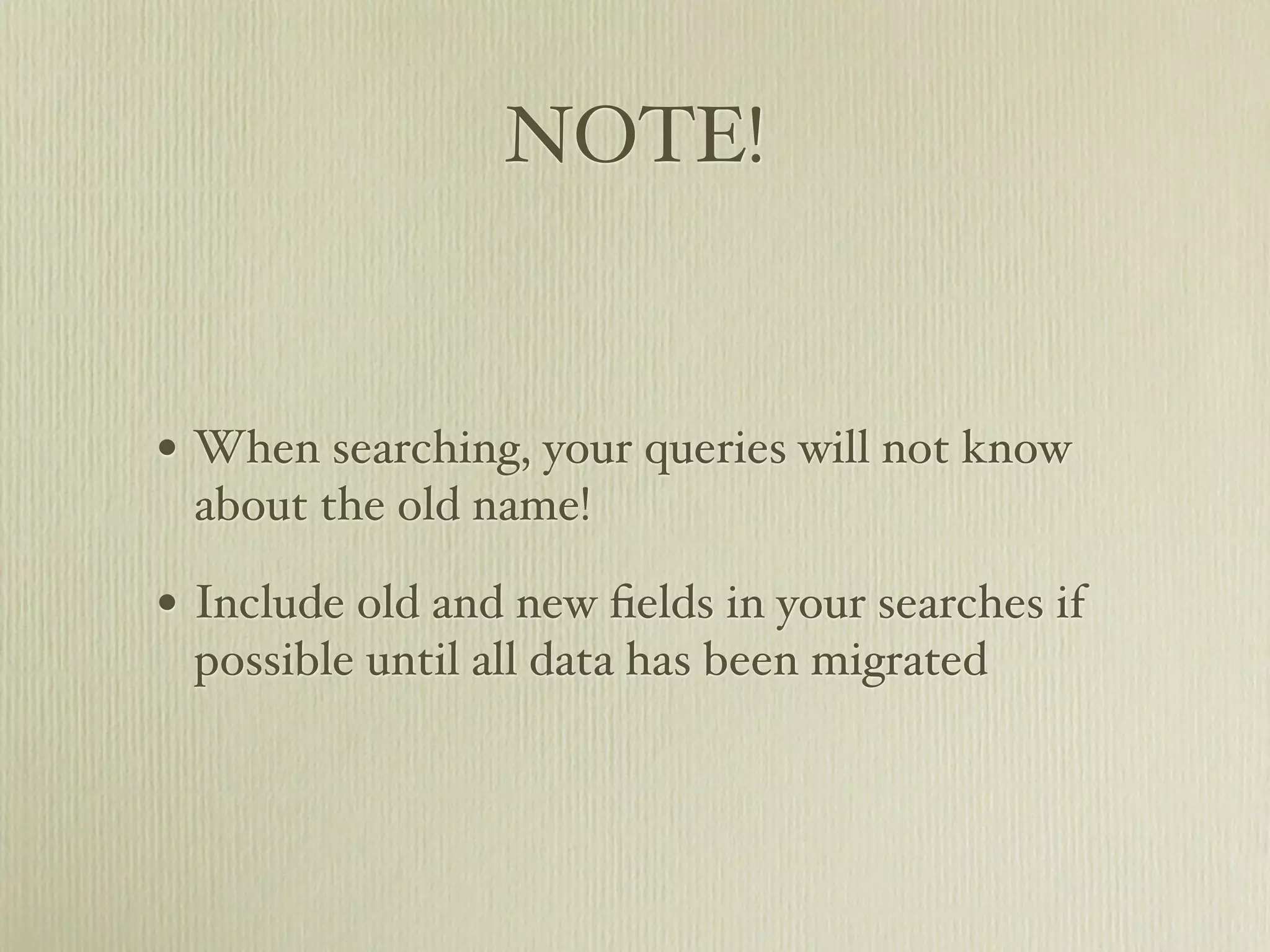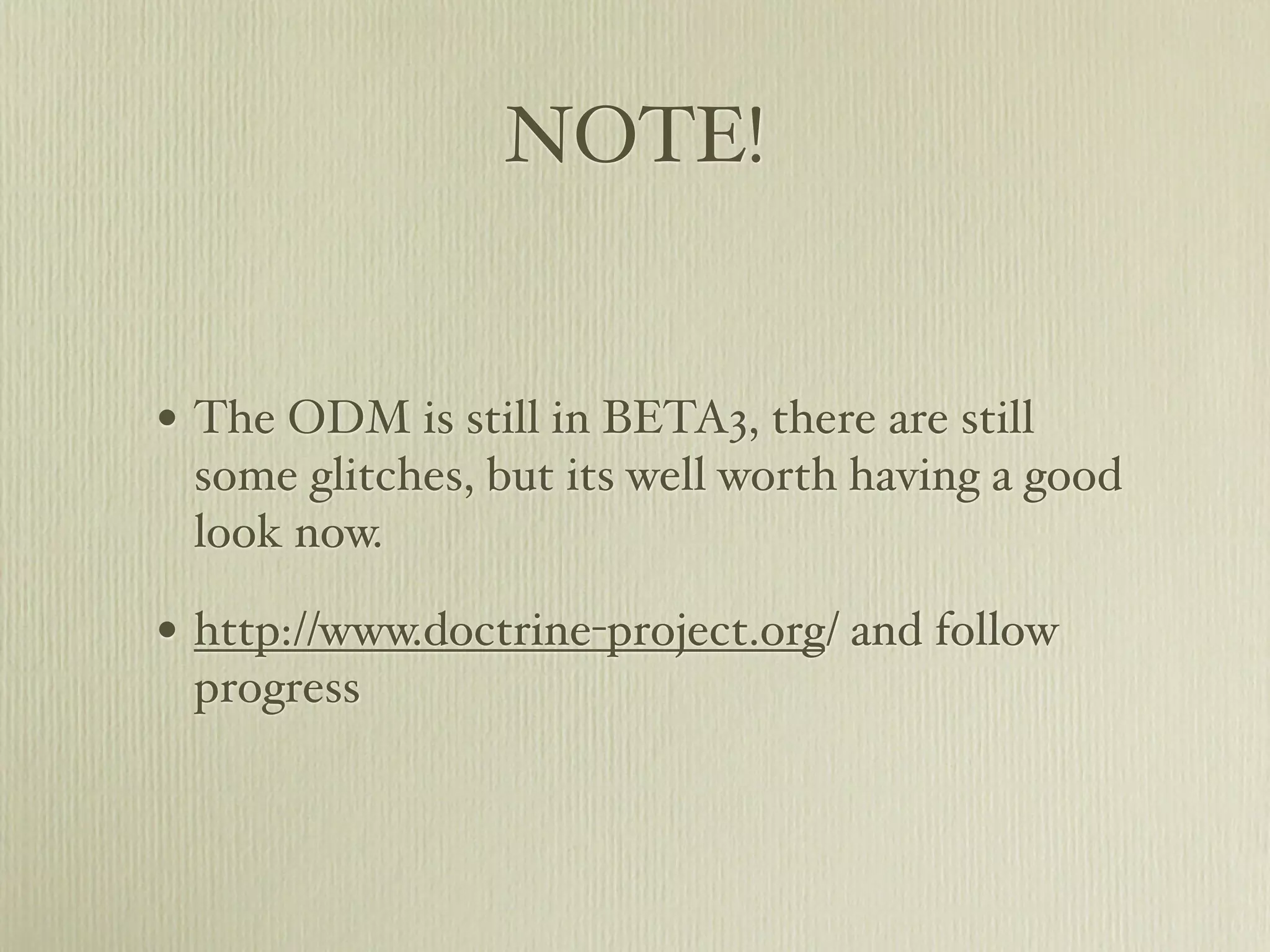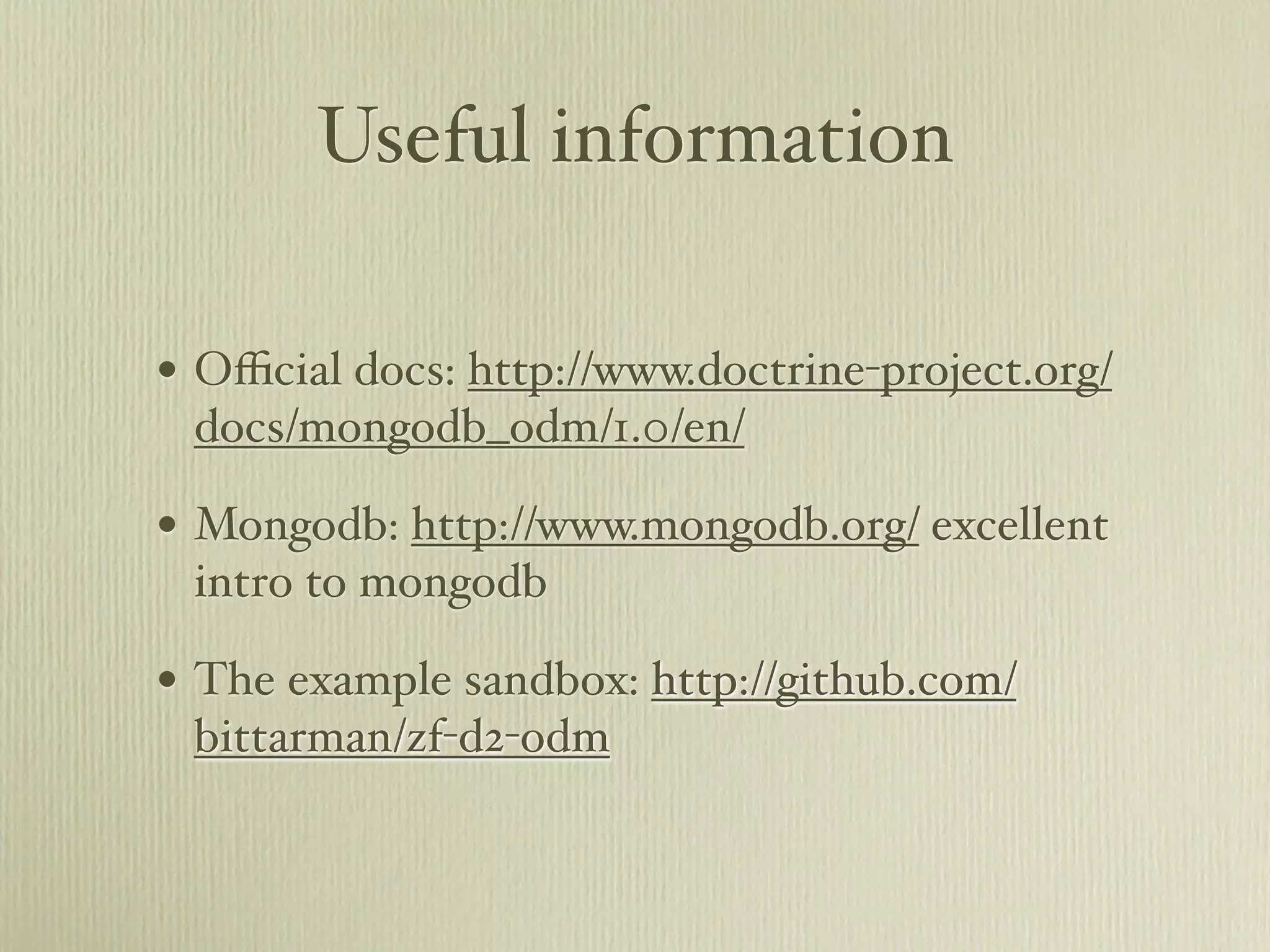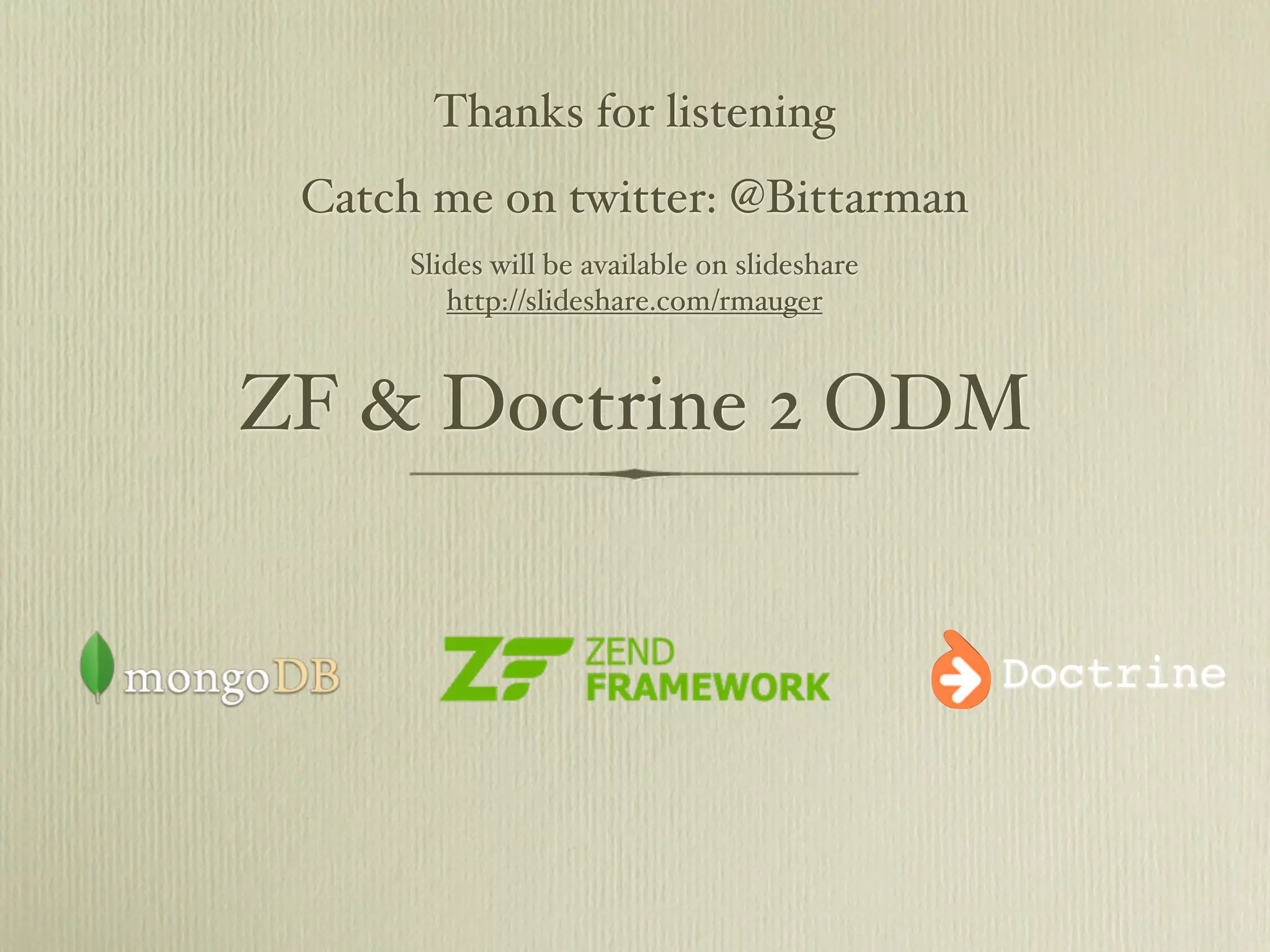The document provides an overview of the Doctrine 2 Object Document Mapper (ODM) developed by Ryan Mauger, including its advantages like schema-less design, ease of use with JSON, and separation of persistence logic. It contains code examples for creating, updating, and managing documents and comments in a blog application using Zend Framework. Additional details on the configuration, entity annotations, and resources for installation and integration with Zend Framework are also included.
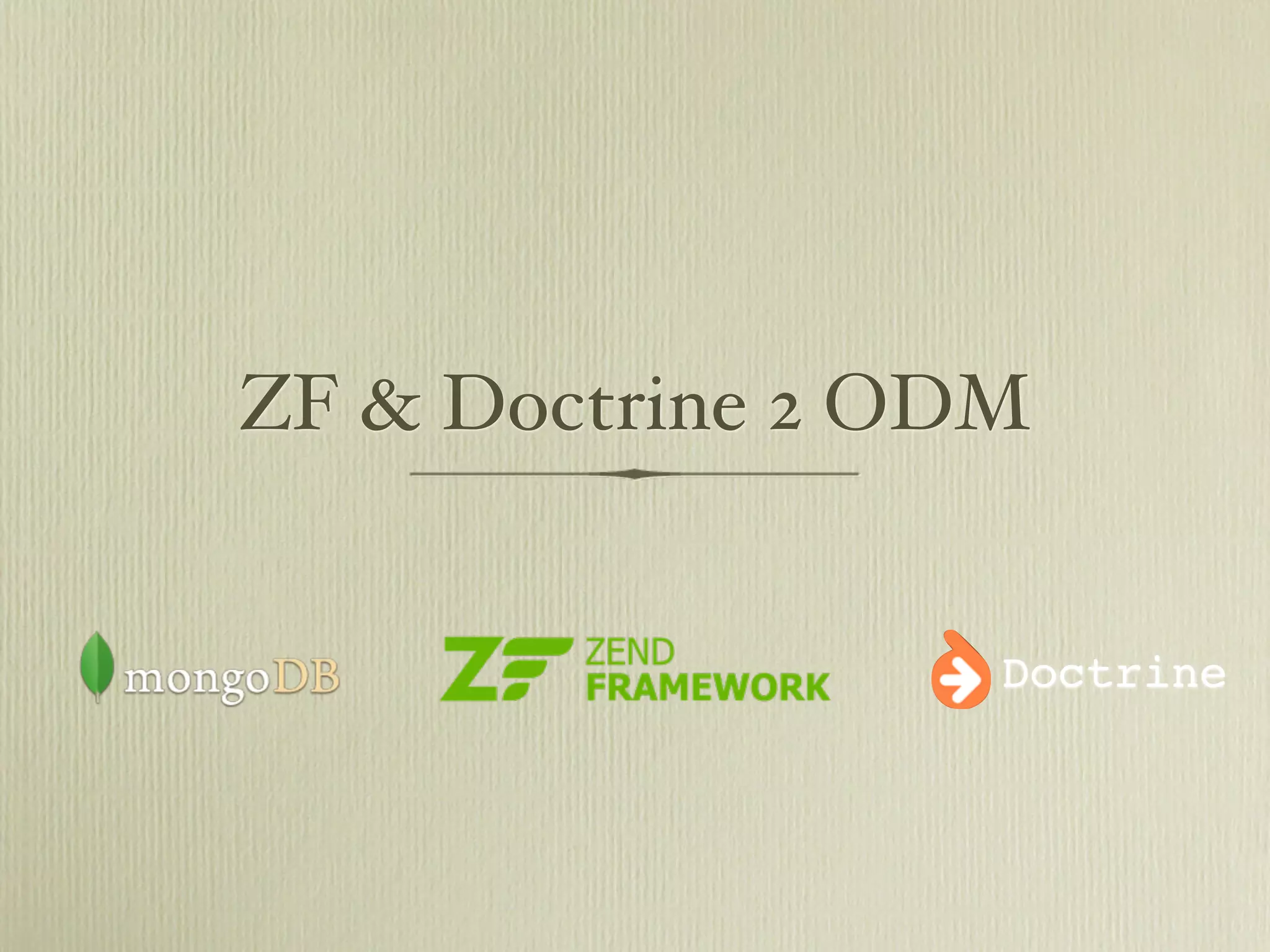
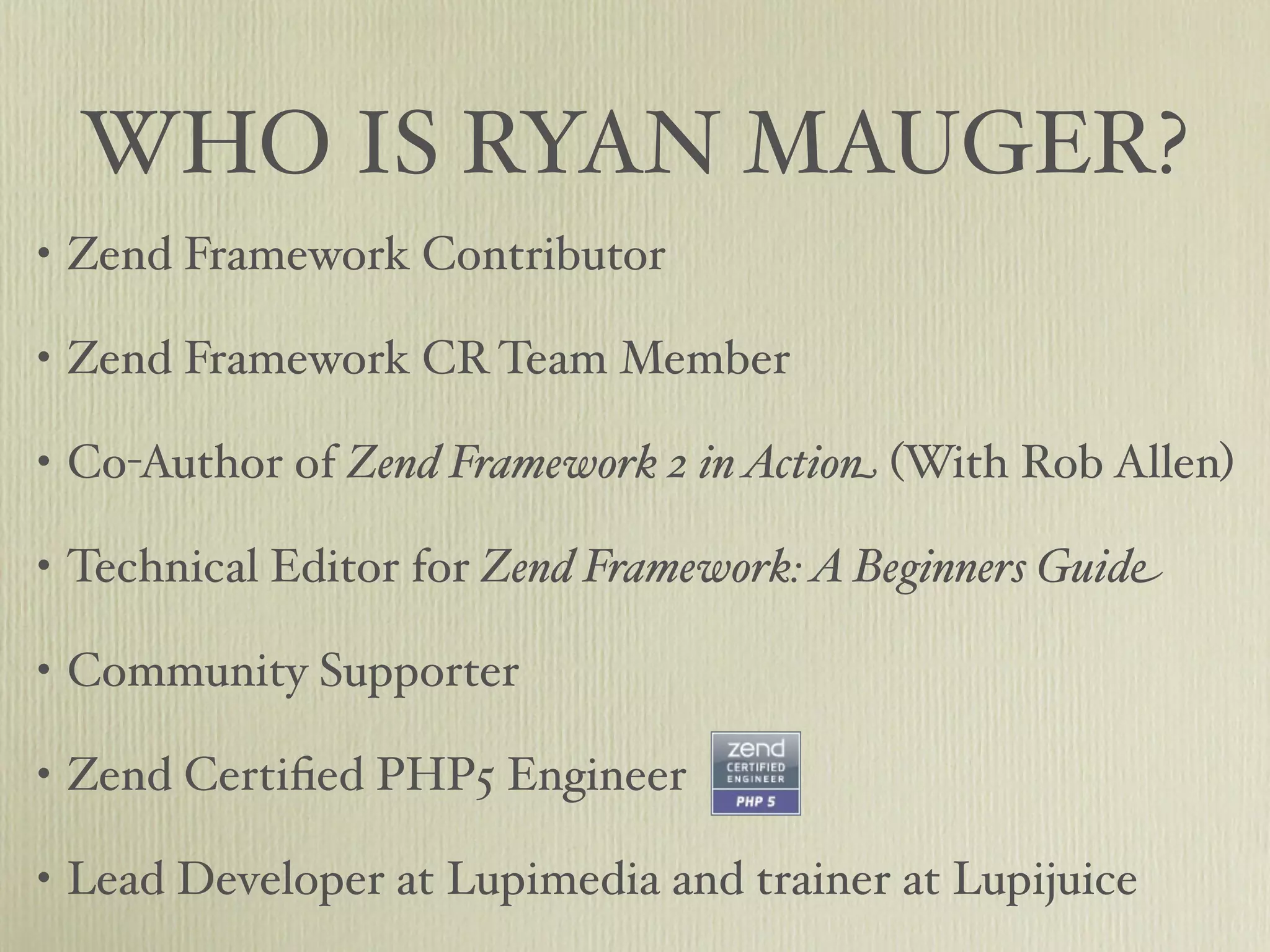
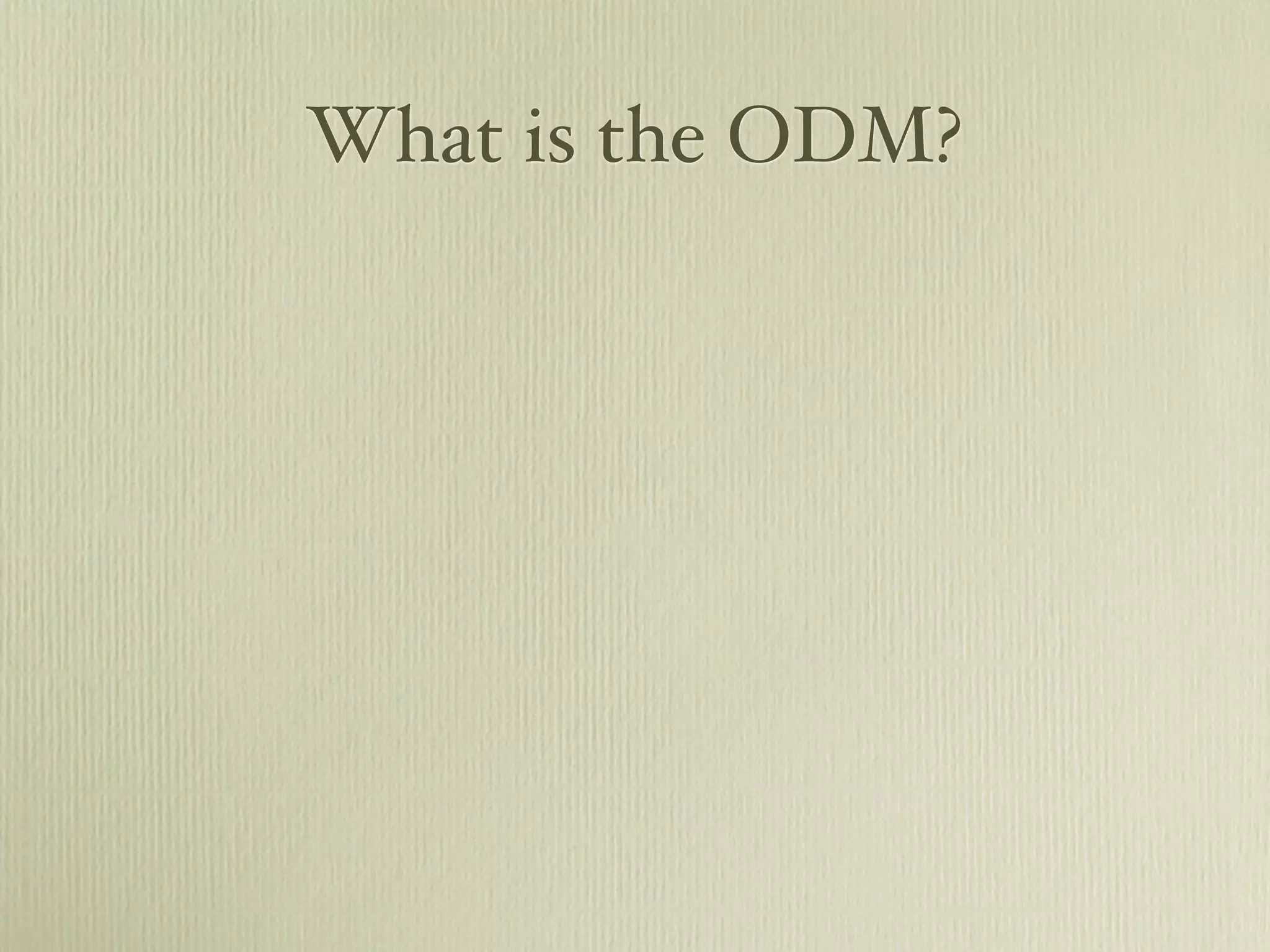
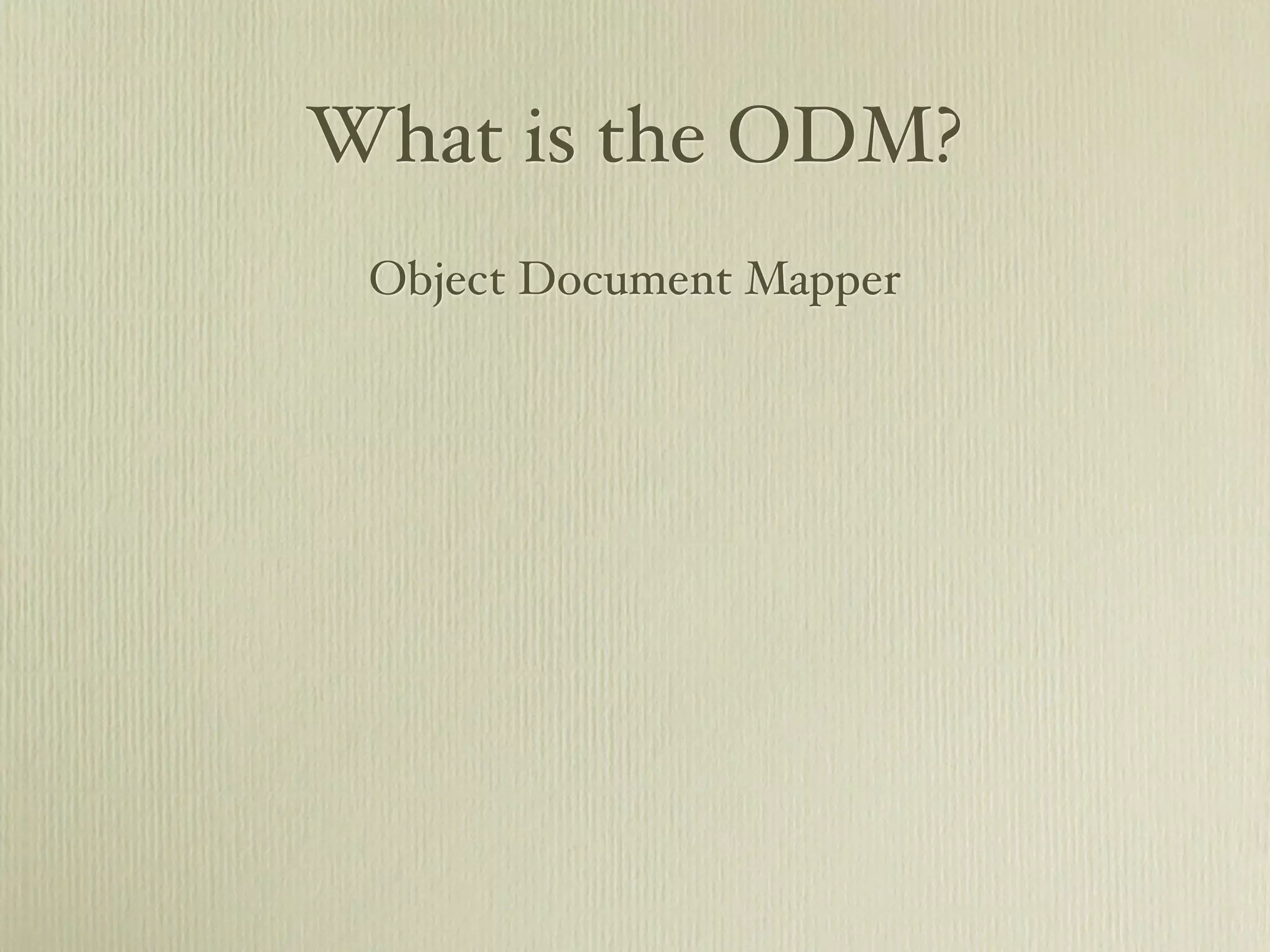
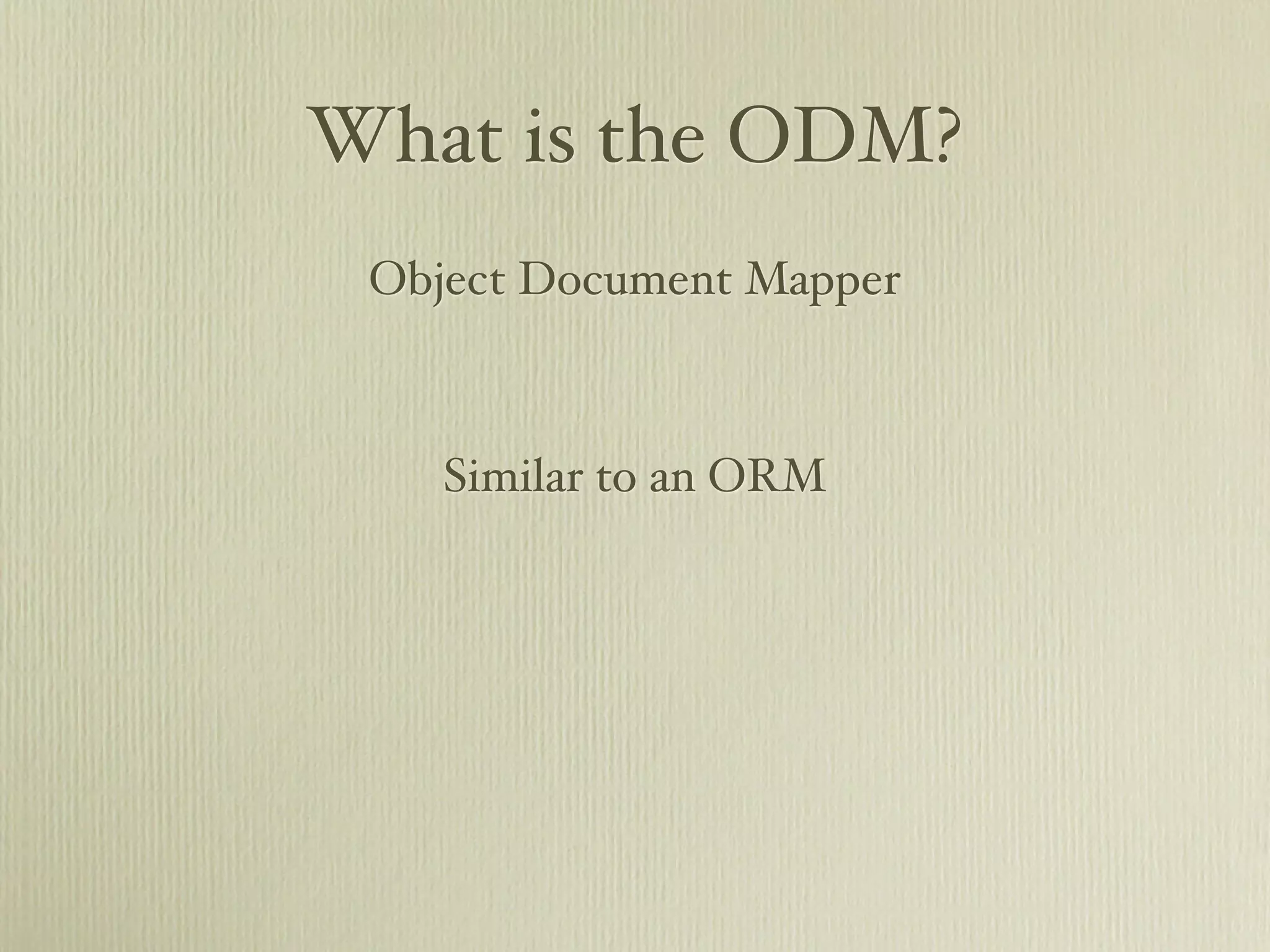
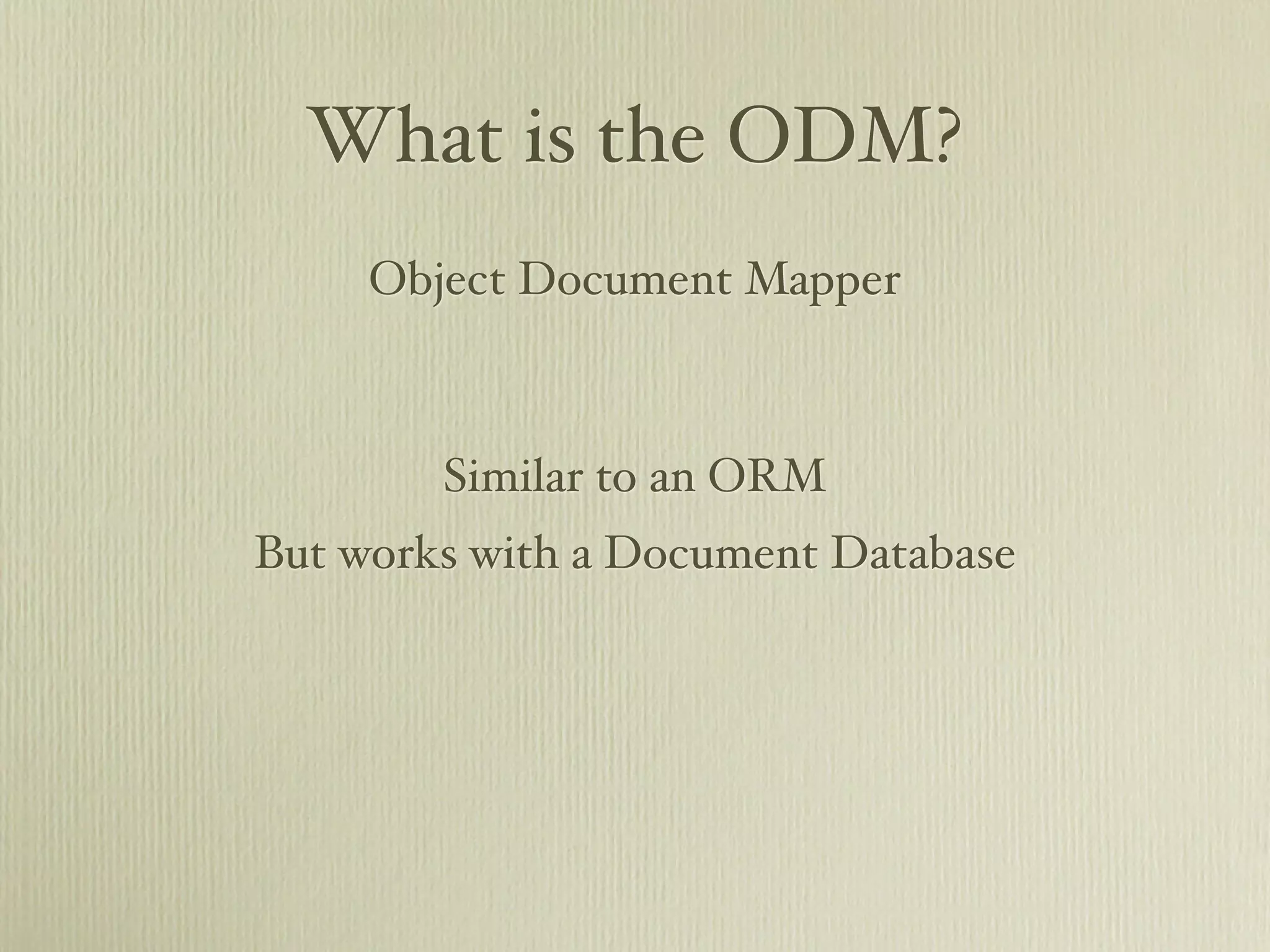
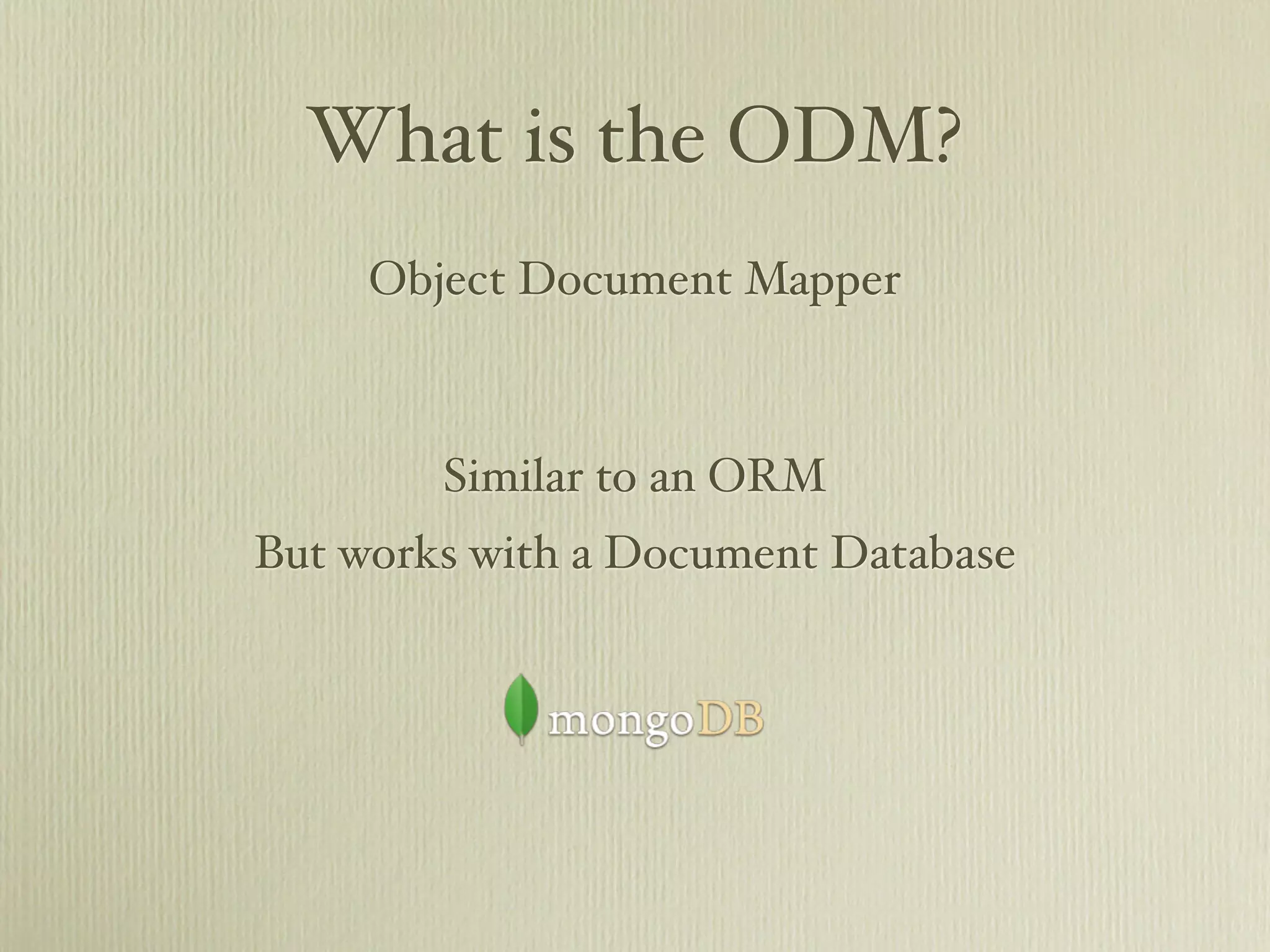
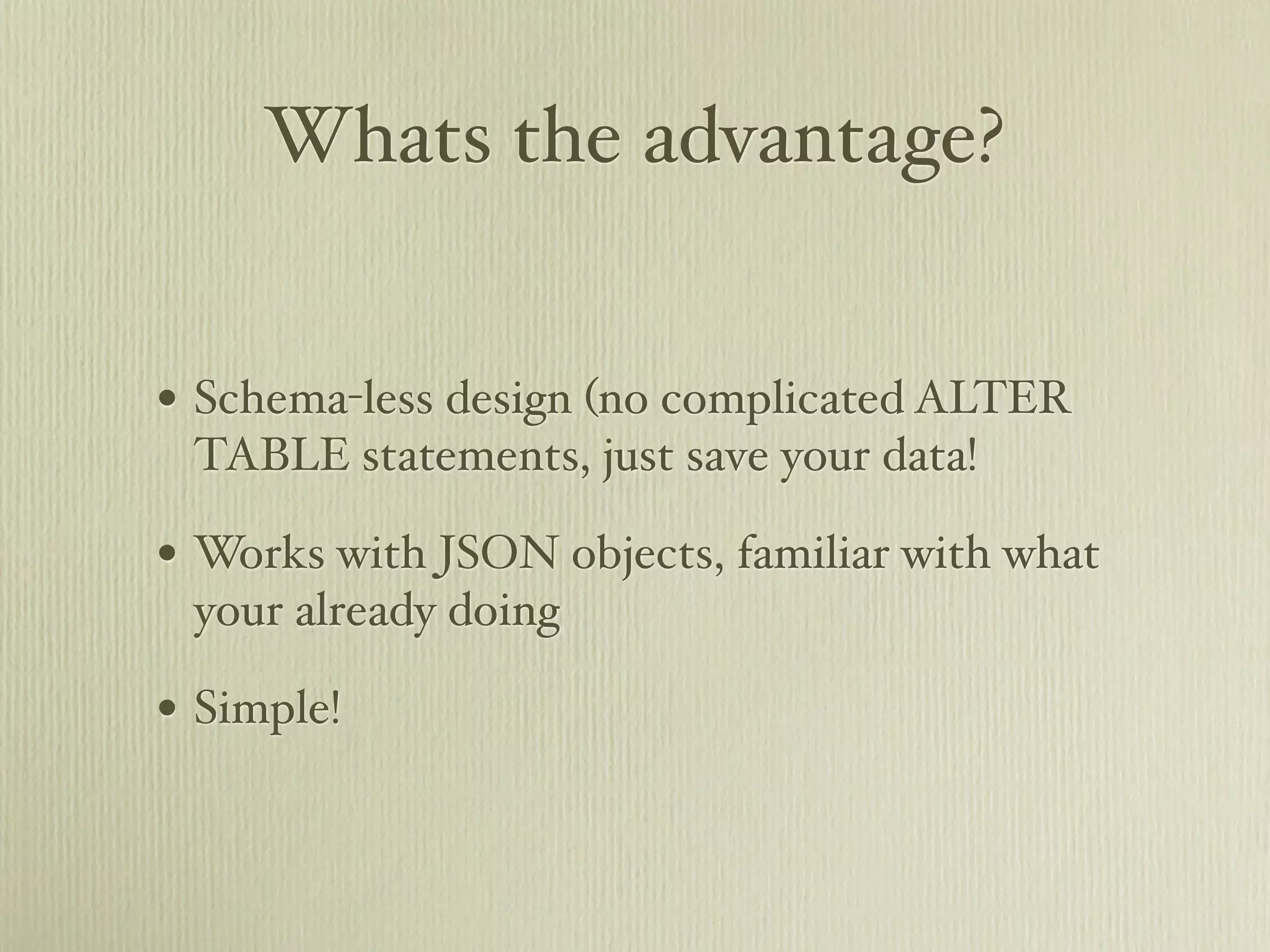
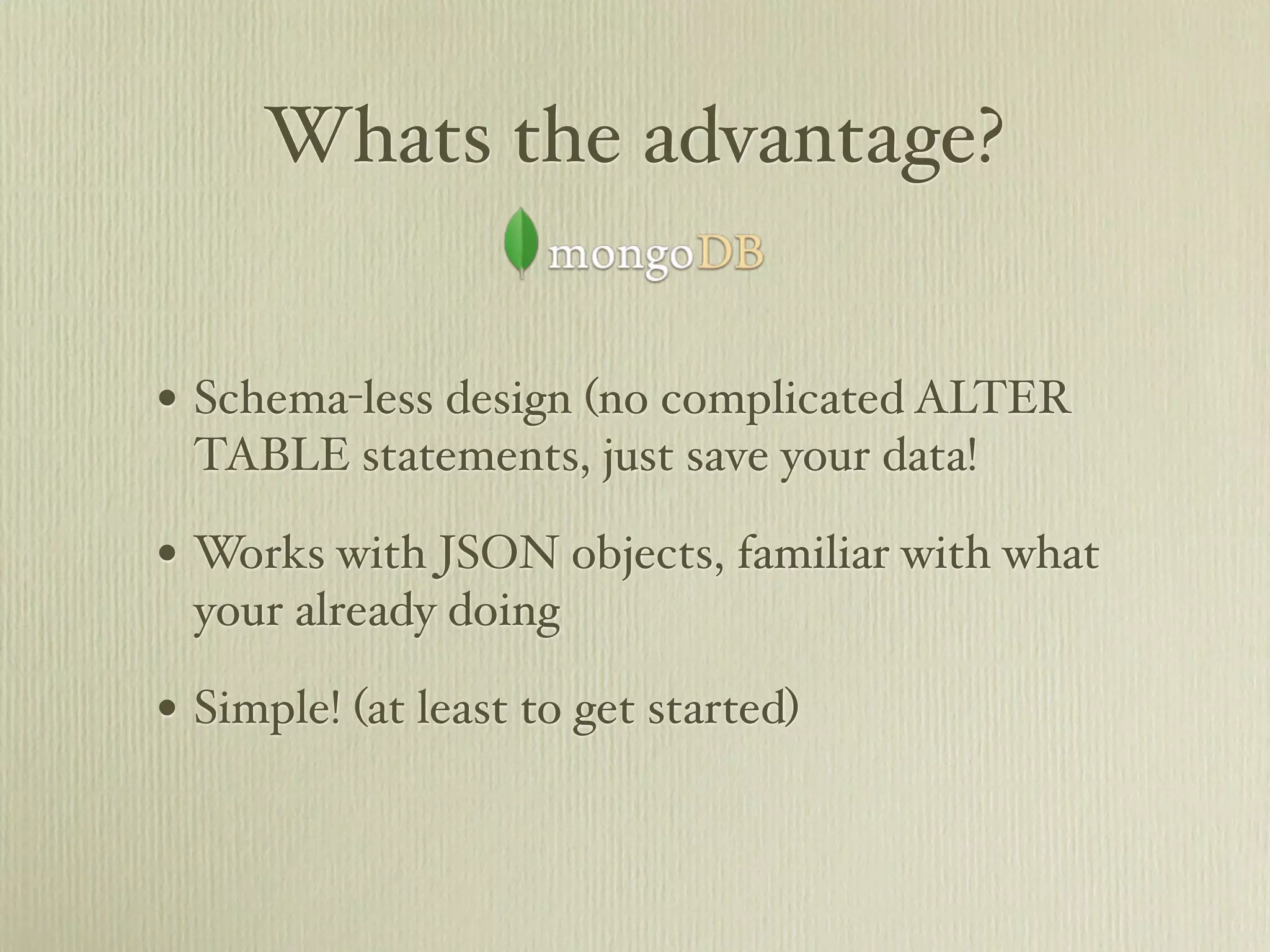
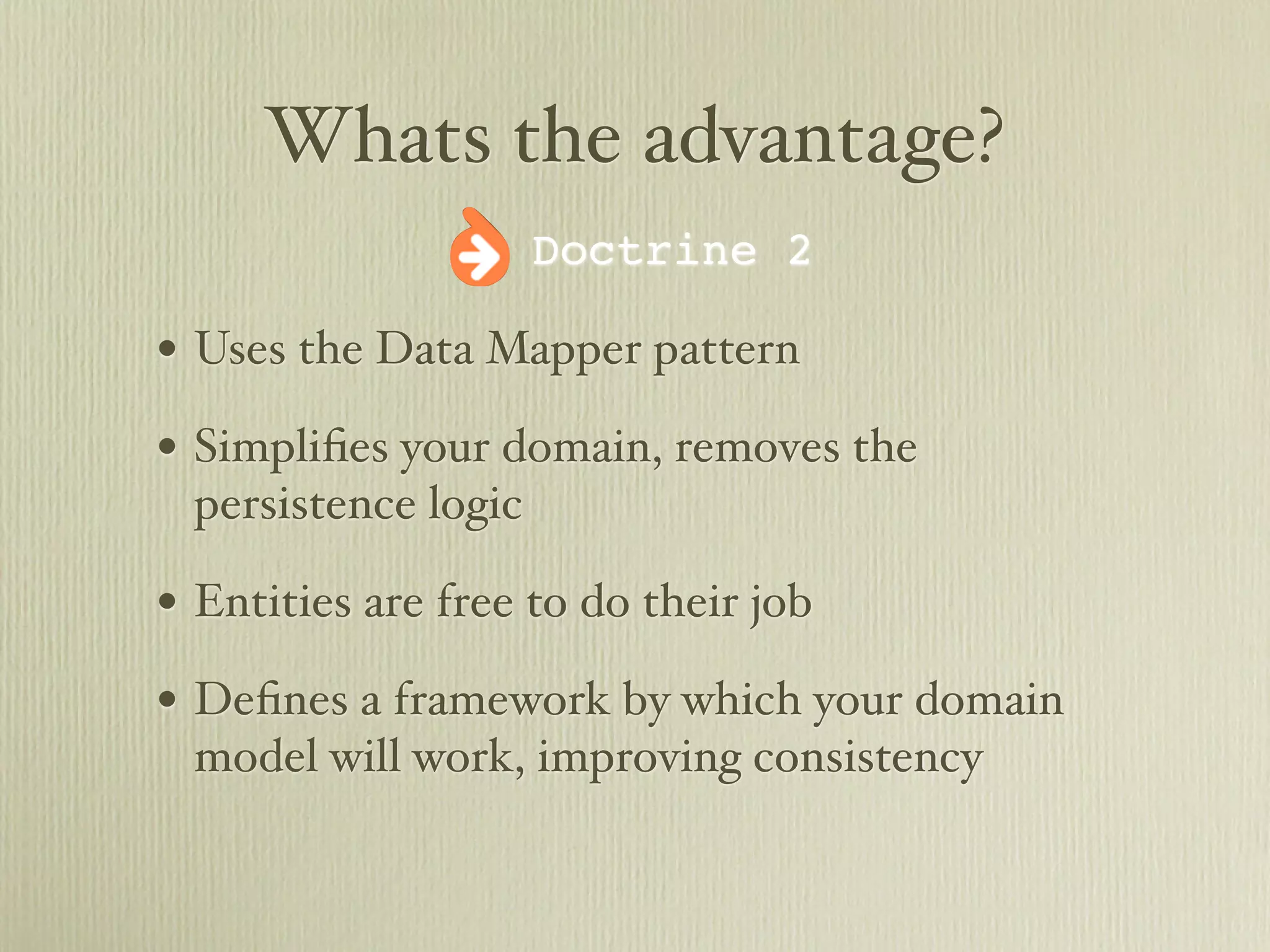
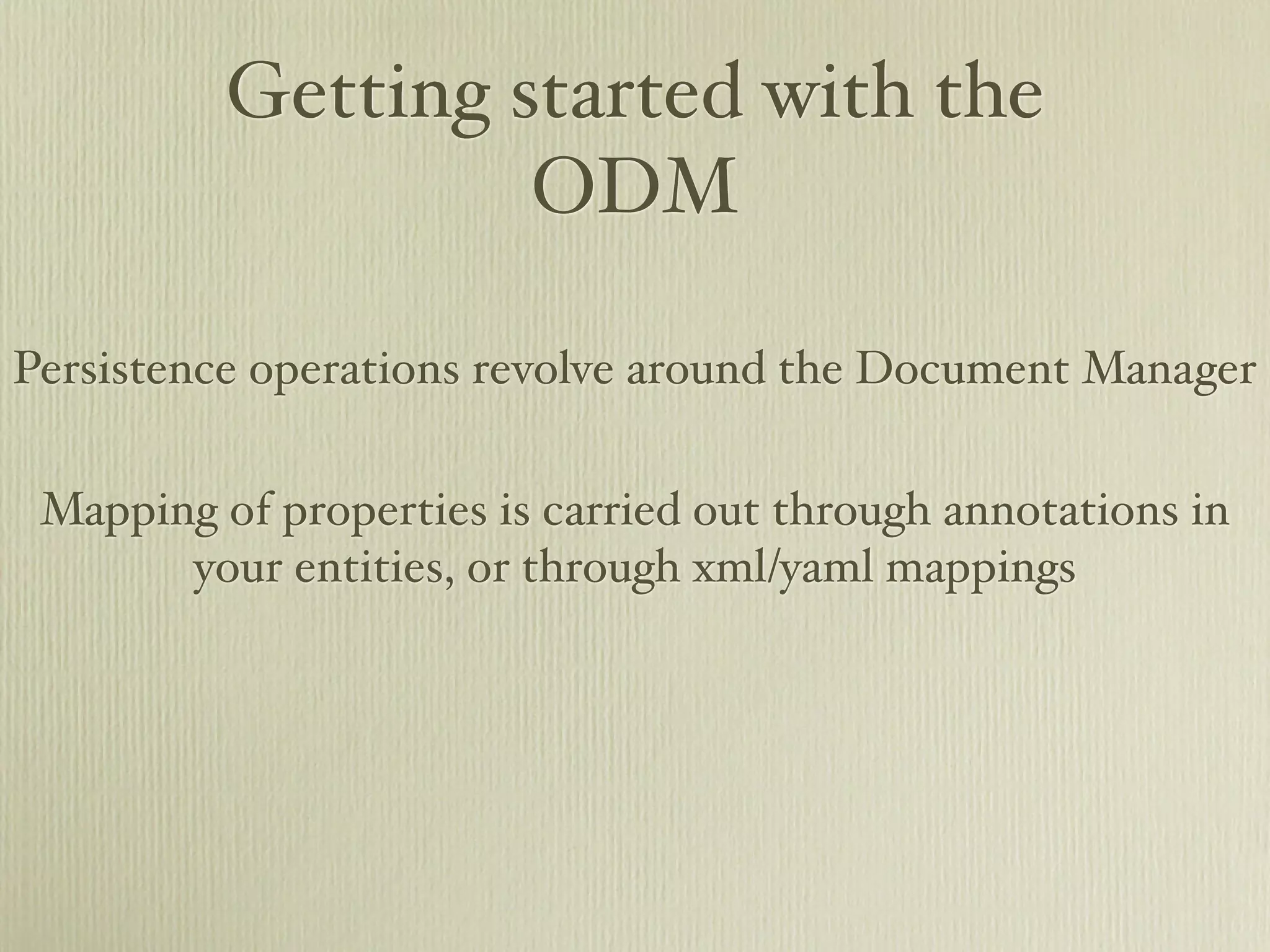
![<?php namespace ApplicationBlog; /** * @Document(db="blog", collection="posts") */ class Post { /** * @Id */ private $id; An example entity /** * @Field(type="string") */ private $title; /** * @String */ Properties private $content; /** /** * @EmbedMany(targetDocument="ApplicationBlogComment") */ * @Id private $comments = array(); */ public function getId() private $id; { return $this->id; } /** public function setId($id) * @Field(type="string") { $this->id = (string) $id; */ return $this; private $title; } public function getTitle() { /** return $this->title; * @String } */ public function setTitle($title) private $content; { $this->title = (string) $title; } return $this; /** * @EmbedMany(targetDocument="ApplicationBlogComment") public function getContent() { */ return $this->content; private $comments = array(); } public function setContent($content) { $this->content = (string) $content; return $this; } public function getComments() { return $this->comments; } public function addComment(ApplicationBlogComment $comment) { $this->comments[] = $comment; return $this; } }](https://image.slidesharecdn.com/zf-odm-110527031559-phpapp01/75/Zend-Framework-and-the-Doctrine2-MongoDB-ODM-ZF1-12-2048.jpg)
![<?php namespace ApplicationBlog; /** * @Document(db="blog", collection="posts") */ class Post { /** * @Id */ private $id; An example entity /** * @Field(type="string") */ private $title; /** * @String */ Methods private $content; /** * @EmbedMany(targetDocument="ApplicationBlogComment") public function getContent() */ { private $comments = array(); return $this->content; public function getId() } { return $this->id; } public function setContent($content) public function setId($id) { { $this->id = (string) $id; $this->content = (string) $content; return $this; return $this; } } public function getTitle() { return $this->title; public function getComments() } { public function setTitle($title) return $this->comments; { $this->title = (string) $title; } return $this; } public function addComment(ApplicationBlogComment $comment) public function getContent() { { return $this->content; $this->comments[] = $comment; } return $this; public function setContent($content) { } $this->content = (string) $content; return $this; } public function getComments() { return $this->comments; } public function addComment(ApplicationBlogComment $comment) { $this->comments[] = $comment; return $this; } }](https://image.slidesharecdn.com/zf-odm-110527031559-phpapp01/75/Zend-Framework-and-the-Doctrine2-MongoDB-ODM-ZF1-13-2048.jpg)
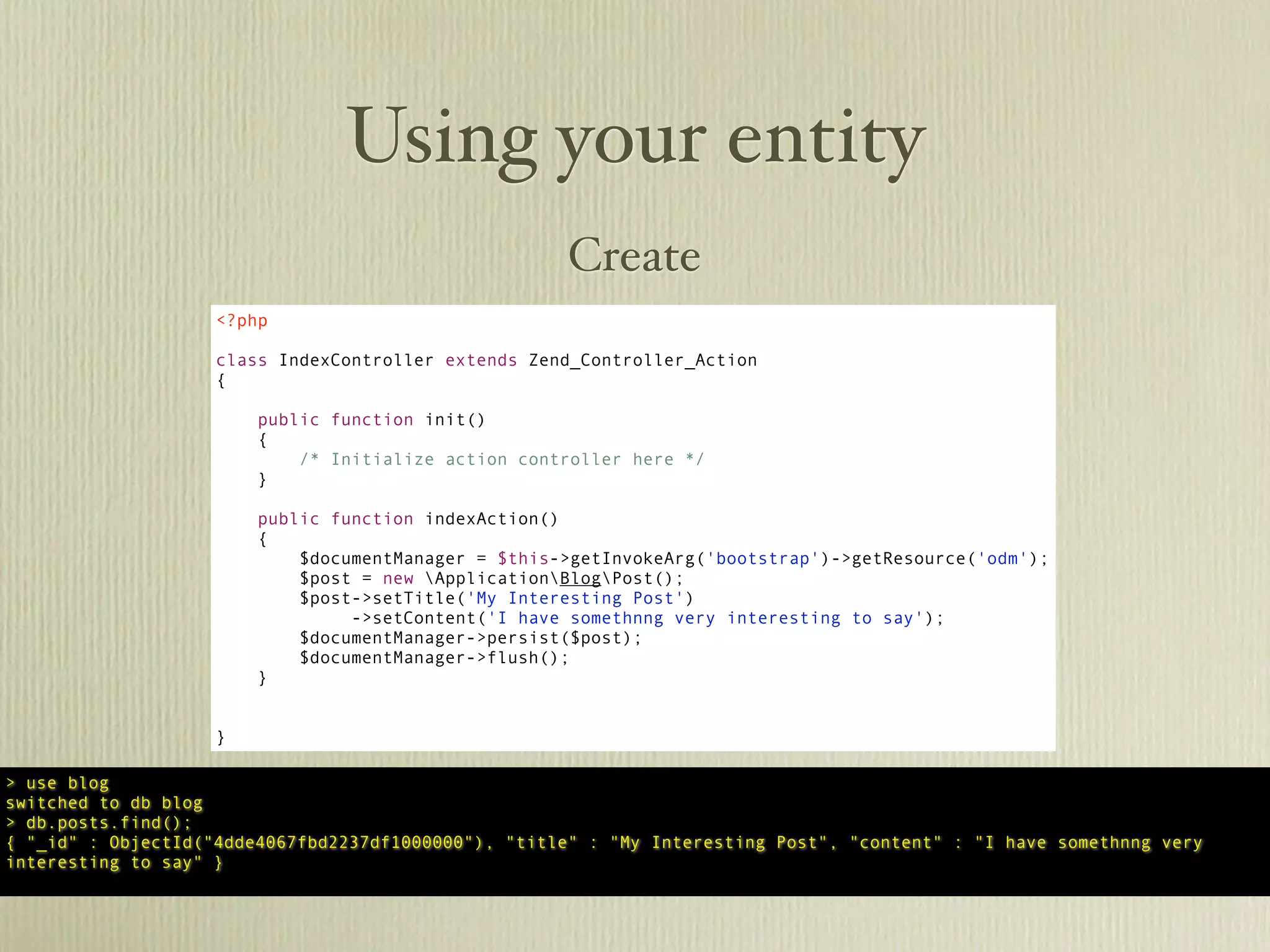
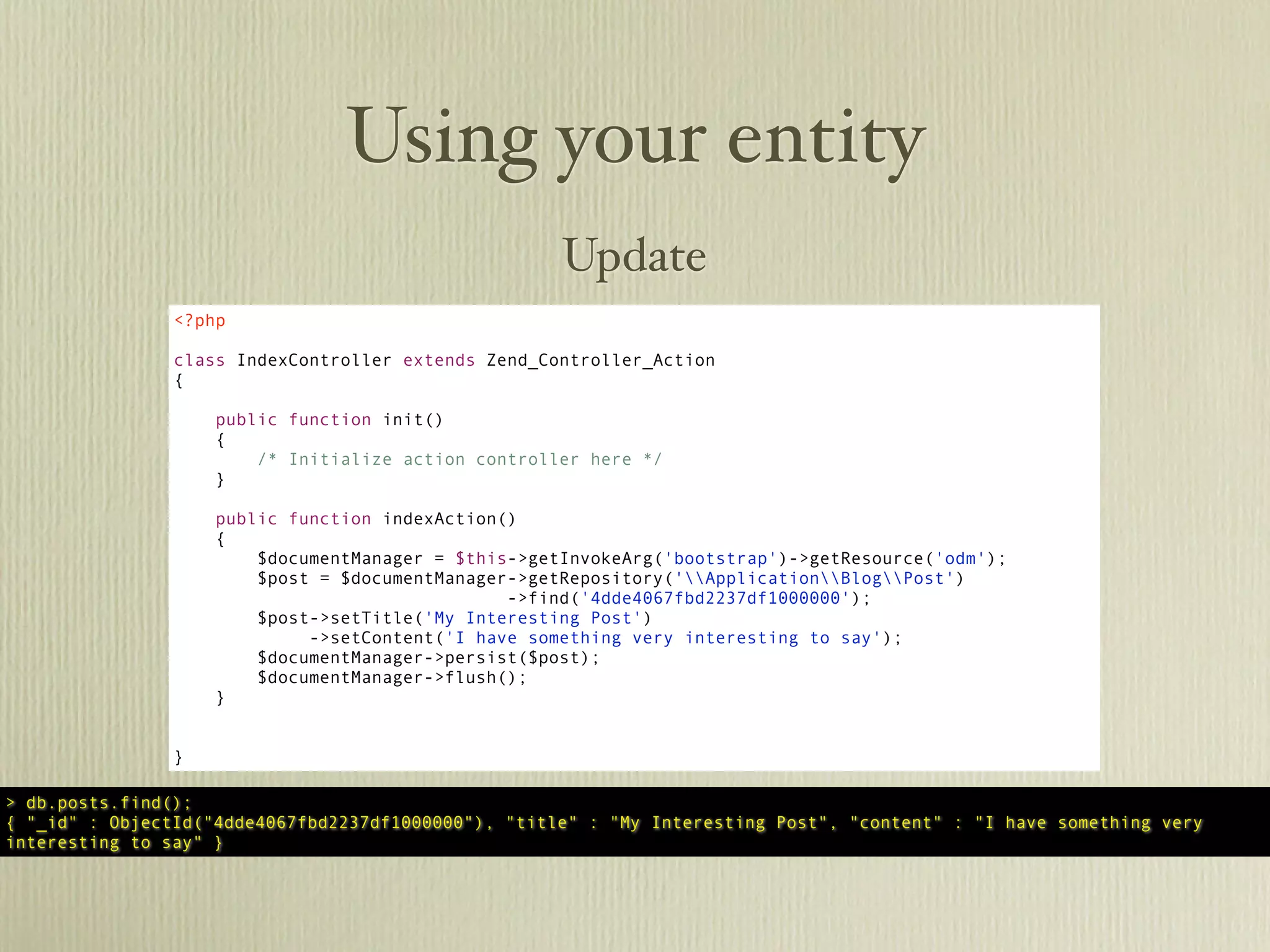
![Using your entity Add an comment <?php class IndexController extends Zend_Controller_Action { public function init() { /* Initialize action controller here */ } public function indexAction() { $documentManager = $this->getInvokeArg('bootstrap')->getResource('odm'); $post = $documentManager->getRepository('ApplicationBlogPost') ->find('4dde4067fbd2237df1000000'); $comment = new ApplicationBlogComment(); $comment->setEmail('foo@example.com') ->setComment('Nice post!'); $post->addComment($comment); $documentManager->persist($post); $documentManager->flush(); } } > db.posts.find(); { "_id" : ObjectId("4dde4067fbd2237df1000000"), "comments" : [ { "_id" : ObjectId("4dde439afbd22380f1000000"), "email" : "foo@example.com", "comment" : "Nice post!" } ], "content" : "I have something very interesting to say", "title" : "My Interesting Post" }](https://image.slidesharecdn.com/zf-odm-110527031559-phpapp01/75/Zend-Framework-and-the-Doctrine2-MongoDB-ODM-ZF1-16-2048.jpg)
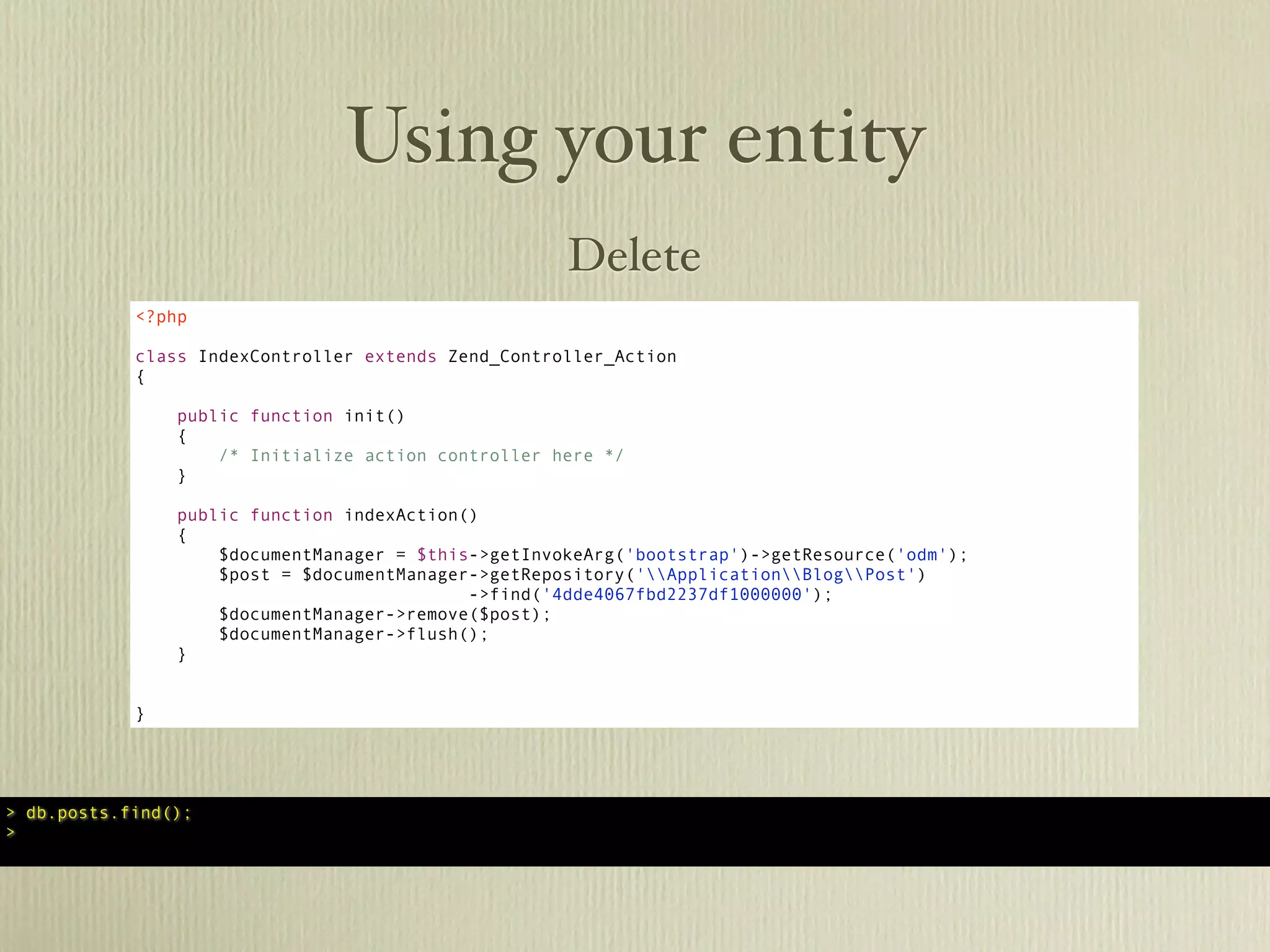
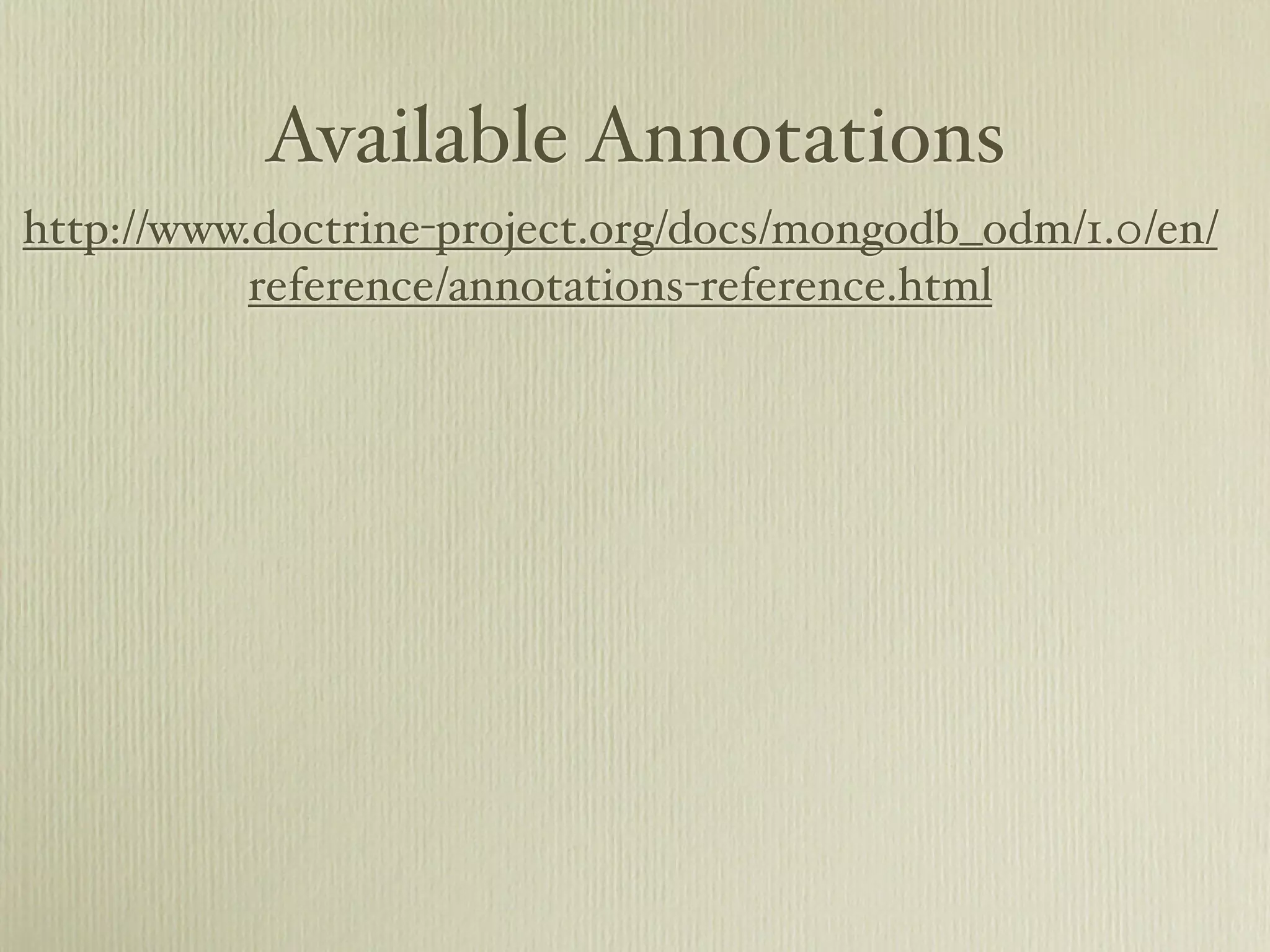
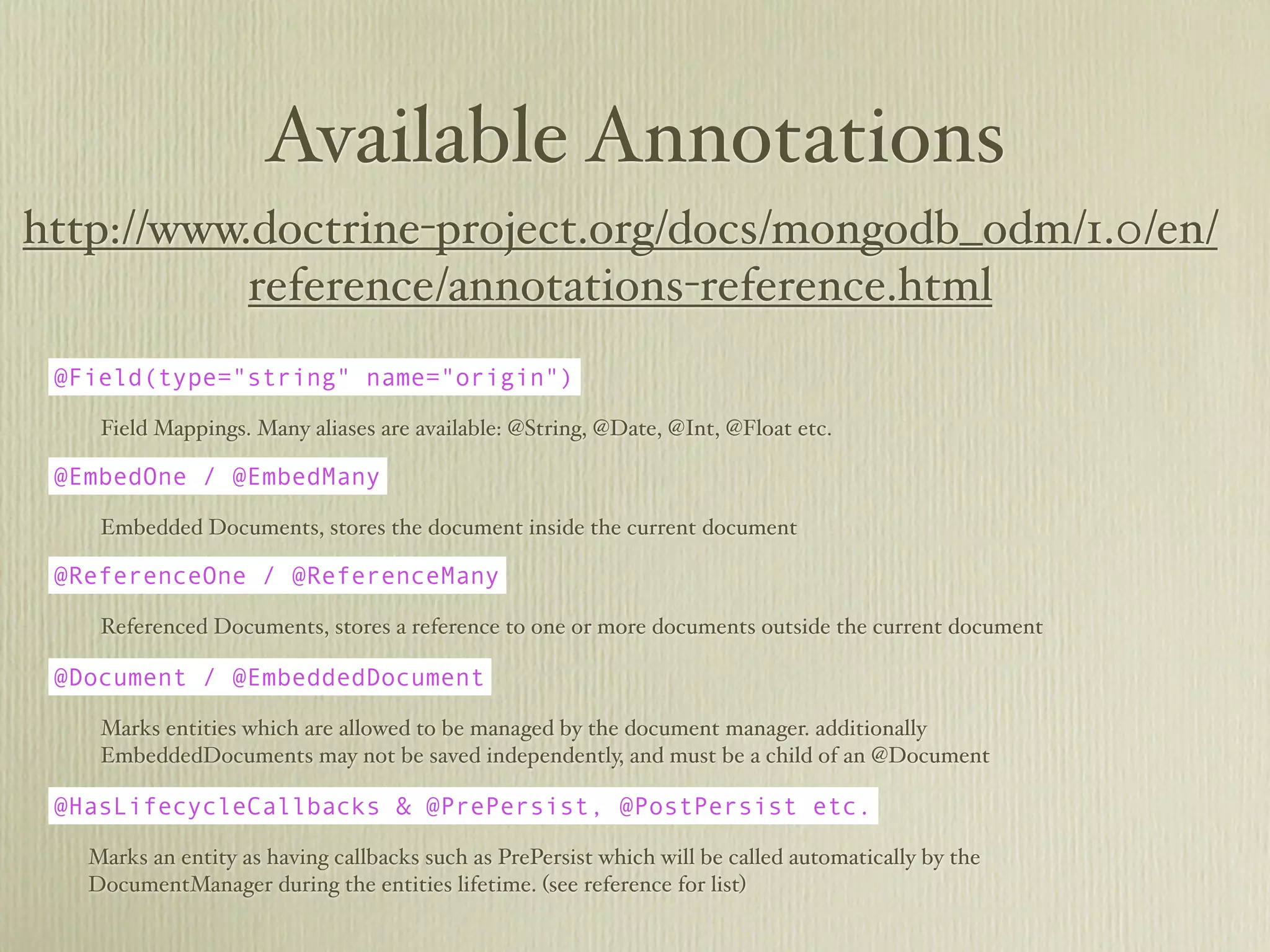

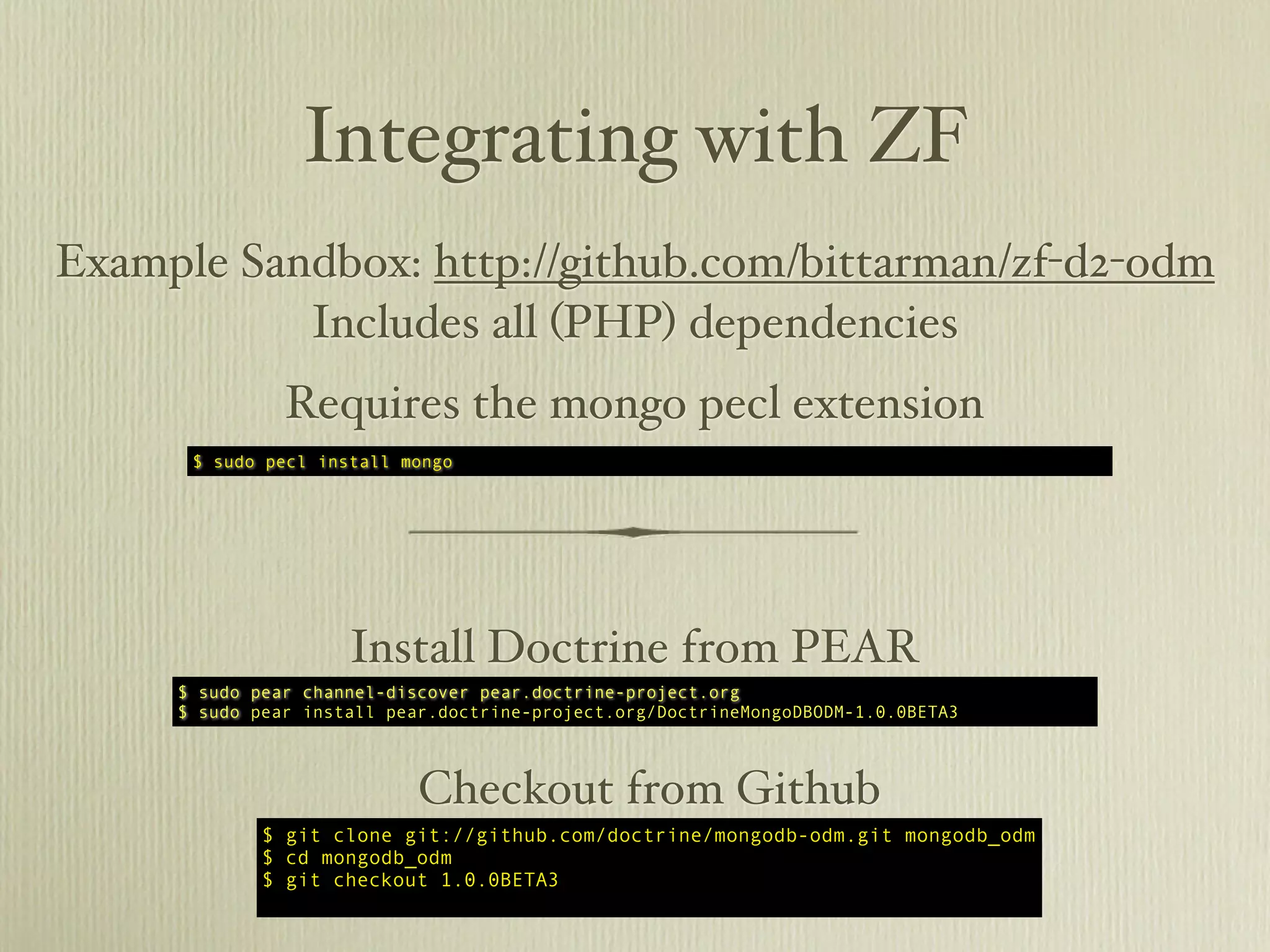
![The Plugin Resource <?php /* Import namespaces */ use DoctrineCommonClassLoader, DoctrineCommonAnnotationsAnnotationReader, DoctrineODMMongoDB, DoctrineODMMongoDBDocumentManager, DoctrineODMMongoDBMongo, DoctrineODMMongoDBMappingDriverAnnotationDriver; /** * Doctrine 2 ODM Resource Plugin * * @author Ryan Mauger * @copyright Ryan Mauger 2012 */ class Lupi_Resource_Odm extends Zend_Application_Resource_ResourceAbstract { public function init() { $options = $this->getOptions(); $this->registerAutoloaders($options); // Config $config = new DoctrineODMMongoDBConfiguration(); foreach ($options['config'] as $option => $value) { $method = "set" . ucfirst($option); $config->{$method}($value); } // Annotation reader $reader = new AnnotationReader(); $reader->setDefaultAnnotationNamespace('DoctrineODMMongoDBMapping'); $config->setMetadataDriverImpl(new AnnotationDriver($reader, $options['documents']['dir'])); $dm = DocumentManager::create(new DoctrineMongoDBConnection(new Mongo), $config); return $dm; } public function registerAutoloaders($options) { $autoloader = Zend_Loader_Autoloader::getInstance(); // Document classes $classLoader = new ClassLoader($options['documents']['namespace'], $options['documents']['dir']); $autoloader->pushAutoloader(array($classLoader, 'loadClass'), $options['documents']['namespace']); } }](https://image.slidesharecdn.com/zf-odm-110527031559-phpapp01/75/Zend-Framework-and-the-Doctrine2-MongoDB-ODM-ZF1-22-2048.jpg)
![The Plugin Resource <?php /* Import namespaces */ use DoctrineCommonClassLoader, DoctrineCommonAnnotationsAnnotationReader, DoctrineODMMongoDB, DoctrineODMMongoDBDocumentManager, DoctrineODMMongoDBMongo, DoctrineODMMongoDBMappingDriverAnnotationDriver; /** * Doctrine 2 ODM Resource Plugin * * @author Ryan Mauger * @copyright Ryan Mauger 2012 */ class Lupi_Resource_Odm extends Zend_Application_Resource_ResourceAbstract { public function init() { $options = $this->getOptions(); $this->registerAutoloaders($options); Set up class loaders. // Config $config = new DoctrineODMMongoDBConfiguration(); foreach ($options['config'] as $option => $value) { $method = "set" . ucfirst($option); Use the Doctrine $config->{$method}($value); } // Annotation reader loaders for ease $reader = new AnnotationReader(); $reader->setDefaultAnnotationNamespace('DoctrineODMMongoDBMapping'); $config->setMetadataDriverImpl(new AnnotationDriver($reader, $options['documents']['dir'])); $dm = DocumentManager::create(new DoctrineMongoDBConnection(new Mongo), $config); return $dm; } public function registerAutoloaders($options) { $autoloader = Zend_Loader_Autoloader::getInstance(); // Document classes $classLoader = new ClassLoader($options['documents']['namespace'], $options['documents']['dir']); $autoloader->pushAutoloader(array($classLoader, 'loadClass'), $options['documents']['namespace']); } }](https://image.slidesharecdn.com/zf-odm-110527031559-phpapp01/75/Zend-Framework-and-the-Doctrine2-MongoDB-ODM-ZF1-23-2048.jpg)
![The Plugin Resource <?php /* Import namespaces */ use DoctrineCommonClassLoader, DoctrineCommonAnnotationsAnnotationReader, DoctrineODMMongoDB, DoctrineODMMongoDBDocumentManager, DoctrineODMMongoDBMongo, DoctrineODMMongoDBMappingDriverAnnotationDriver; /** * Doctrine 2 ODM Resource Plugin * * @author Ryan Mauger * @copyright Ryan Mauger 2012 */ class Lupi_Resource_Odm extends Zend_Application_Resource_ResourceAbstract { public function init() { $options = $this->getOptions(); $this->registerAutoloaders($options); // Config $config = new DoctrineODMMongoDBConfiguration(); foreach ($options['config'] as $option => $value) { Set up the config object $method = "set" . ucfirst($option); $config->{$method}($value); } // Annotation reader $reader = new AnnotationReader(); $reader->setDefaultAnnotationNamespace('DoctrineODMMongoDBMapping'); $config->setMetadataDriverImpl(new AnnotationDriver($reader, $options['documents']['dir'])); $dm = DocumentManager::create(new DoctrineMongoDBConnection(new Mongo), $config); return $dm; } public function registerAutoloaders($options) { $autoloader = Zend_Loader_Autoloader::getInstance(); // Document classes $classLoader = new ClassLoader($options['documents']['namespace'], $options['documents']['dir']); $autoloader->pushAutoloader(array($classLoader, 'loadClass'), $options['documents']['namespace']); } }](https://image.slidesharecdn.com/zf-odm-110527031559-phpapp01/75/Zend-Framework-and-the-Doctrine2-MongoDB-ODM-ZF1-24-2048.jpg)
![The Plugin Resource <?php /* Import namespaces */ use DoctrineCommonClassLoader, DoctrineCommonAnnotationsAnnotationReader, DoctrineODMMongoDB, DoctrineODMMongoDBDocumentManager, DoctrineODMMongoDBMongo, DoctrineODMMongoDBMappingDriverAnnotationDriver; /** * Doctrine 2 ODM Resource Plugin * * @author Ryan Mauger * @copyright Ryan Mauger 2012 */ class Lupi_Resource_Odm extends Zend_Application_Resource_ResourceAbstract { public function init() { Set up the Annotation $options = $this->getOptions(); $this->registerAutoloaders($options); // Config Reader, or mapping driver $config = new DoctrineODMMongoDBConfiguration(); foreach ($options['config'] as $option => $value) { $method = "set" . ucfirst($option); $config->{$method}($value); should you prefer YAML / } // Annotation reader XML $reader = new AnnotationReader(); $reader->setDefaultAnnotationNamespace('DoctrineODMMongoDBMapping'); $config->setMetadataDriverImpl(new AnnotationDriver($reader, $options['documents']['dir'])); $dm = DocumentManager::create(new DoctrineMongoDBConnection(new Mongo), $config); return $dm; } public function registerAutoloaders($options) { $autoloader = Zend_Loader_Autoloader::getInstance(); // Document classes $classLoader = new ClassLoader($options['documents']['namespace'], $options['documents']['dir']); $autoloader->pushAutoloader(array($classLoader, 'loadClass'), $options['documents']['namespace']); } }](https://image.slidesharecdn.com/zf-odm-110527031559-phpapp01/75/Zend-Framework-and-the-Doctrine2-MongoDB-ODM-ZF1-25-2048.jpg)
![The Plugin Resource <?php /* Import namespaces */ use DoctrineCommonClassLoader, DoctrineCommonAnnotationsAnnotationReader, DoctrineODMMongoDB, DoctrineODMMongoDBDocumentManager, DoctrineODMMongoDBMongo, DoctrineODMMongoDBMappingDriverAnnotationDriver; /** * Doctrine 2 ODM Resource Plugin * * @author Ryan Mauger * @copyright Ryan Mauger 2012 */ class Lupi_Resource_Odm extends Zend_Application_Resource_ResourceAbstract { public function init() { $options = $this->getOptions(); $this->registerAutoloaders($options); // Config Create and return the $config = new DoctrineODMMongoDBConfiguration(); foreach ($options['config'] as $option => $value) { $method = "set" . ucfirst($option); $config->{$method}($value); Document manager } // Annotation reader $reader = new AnnotationReader(); $reader->setDefaultAnnotationNamespace('DoctrineODMMongoDBMapping'); $config->setMetadataDriverImpl(new AnnotationDriver($reader, $options['documents']['dir'])); $dm = DocumentManager::create(new DoctrineMongoDBConnection(new Mongo), $config); return $dm; } public function registerAutoloaders($options) { $autoloader = Zend_Loader_Autoloader::getInstance(); // Document classes $classLoader = new ClassLoader($options['documents']['namespace'], $options['documents']['dir']); $autoloader->pushAutoloader(array($classLoader, 'loadClass'), $options['documents']['namespace']); } }](https://image.slidesharecdn.com/zf-odm-110527031559-phpapp01/75/Zend-Framework-and-the-Doctrine2-MongoDB-ODM-ZF1-26-2048.jpg)
![[production] ; PHP settings phpSettings.display_startup_errors = 0 phpSettings.display_errors = 0 ; Set Plugin path for lupi mongoodm resource Configuration pluginPaths.Lupi_Resource = APPLICATION_PATH "/../library/Lupi/Resource" ; Library include paths & namespaces includePaths.library = APPLICATION_PATH "/../library" autoloaderNamespaces[] = "Lupi" autoloaderNamespaces[] = "Doctrine" ; Bootstrap options bootstrap.path = APPLICATION_PATH "/Bootstrap.php" bootstrap.class = "Bootstrap" ; Applicaiton Setup appnamespace = "Application" resources.frontController.controllerDirectory = APPLICATION_PATH "/controllers" resources.frontController.params.displayExceptions = 0 ; ODM settings resources.odm.documents.dir = APPLICATION_PATH "/entities" resources.odm.documents.namespace = "Application" resources.odm.config.proxyDir = APPLICATION_PATH "/cache/proxies" resources.odm.config.proxyNamespace = "proxies" resources.odm.config.hydratorDir = APPLICATION_PATH "/cache/hydrators" resources.odm.config.hydratorNamespace = "hydrators" [staging : production] [testing : production] phpSettings.display_startup_errors = 1 phpSettings.display_errors = 1 [development : production] phpSettings.display_startup_errors = 1 phpSettings.display_errors = 1 resources.frontController.params.displayExceptions = 1](https://image.slidesharecdn.com/zf-odm-110527031559-phpapp01/75/Zend-Framework-and-the-Doctrine2-MongoDB-ODM-ZF1-27-2048.jpg)
![[production] ; PHP settings phpSettings.display_startup_errors = 0 phpSettings.display_errors = 0 ; Set Plugin path for lupi mongoodm resource Configuration pluginPaths.Lupi_Resource = APPLICATION_PATH "/../library/Lupi/Resource" ; Library include paths & namespaces includePaths.library = APPLICATION_PATH "/../library" autoloaderNamespaces[] = "Lupi" autoloaderNamespaces[] = "Doctrine" ; Bootstrap options Tell it where to load the plugin resource bootstrap.path = APPLICATION_PATH "/Bootstrap.php" bootstrap.class = "Bootstrap" ; Applicaiton Setup appnamespace = "Application" resources.frontController.controllerDirectory = APPLICATION_PATH "/controllers" resources.frontController.params.displayExceptions = 0 ; ODM settings resources.odm.documents.dir = APPLICATION_PATH "/entities" resources.odm.documents.namespace = "Application" resources.odm.config.proxyDir = APPLICATION_PATH "/cache/proxies" resources.odm.config.proxyNamespace = "proxies" resources.odm.config.hydratorDir = APPLICATION_PATH "/cache/hydrators" resources.odm.config.hydratorNamespace = "hydrators" [staging : production] [testing : production] phpSettings.display_startup_errors = 1 phpSettings.display_errors = 1 [development : production] phpSettings.display_startup_errors = 1 phpSettings.display_errors = 1 resources.frontController.params.displayExceptions = 1](https://image.slidesharecdn.com/zf-odm-110527031559-phpapp01/75/Zend-Framework-and-the-Doctrine2-MongoDB-ODM-ZF1-28-2048.jpg)
![[production] ; PHP settings phpSettings.display_startup_errors = 0 phpSettings.display_errors = 0 ; Set Plugin path for lupi mongoodm resource Configuration pluginPaths.Lupi_Resource = APPLICATION_PATH "/../library/Lupi/Resource" ; Library include paths & namespaces includePaths.library = APPLICATION_PATH "/../library" autoloaderNamespaces[] = "Lupi" autoloaderNamespaces[] = "Doctrine" ; Bootstrap options Minimal config to get started bootstrap.path = APPLICATION_PATH "/Bootstrap.php" bootstrap.class = "Bootstrap" ; Applicaiton Setup appnamespace = "Application" resources.frontController.controllerDirectory = APPLICATION_PATH "/controllers" resources.frontController.params.displayExceptions = 0 ; ODM settings resources.odm.documents.dir = APPLICATION_PATH "/entities" resources.odm.documents.namespace = "Application" resources.odm.config.proxyDir = APPLICATION_PATH "/cache/proxies" resources.odm.config.proxyNamespace = "proxies" resources.odm.config.hydratorDir = APPLICATION_PATH "/cache/hydrators" resources.odm.config.hydratorNamespace = "hydrators" [staging : production] [testing : production] phpSettings.display_startup_errors = 1 phpSettings.display_errors = 1 [development : production] phpSettings.display_startup_errors = 1 phpSettings.display_errors = 1 resources.frontController.params.displayExceptions = 1](https://image.slidesharecdn.com/zf-odm-110527031559-phpapp01/75/Zend-Framework-and-the-Doctrine2-MongoDB-ODM-ZF1-29-2048.jpg)
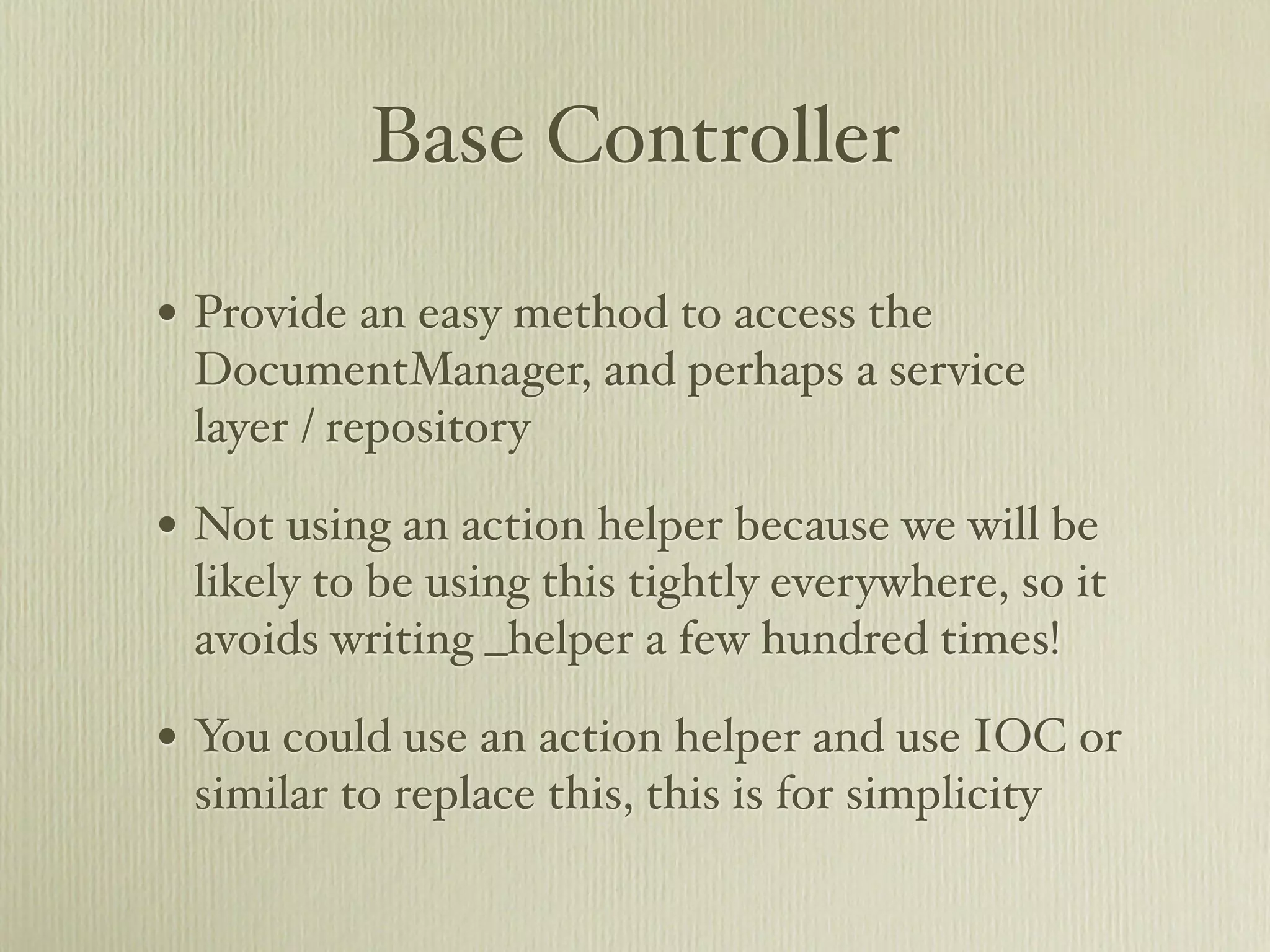
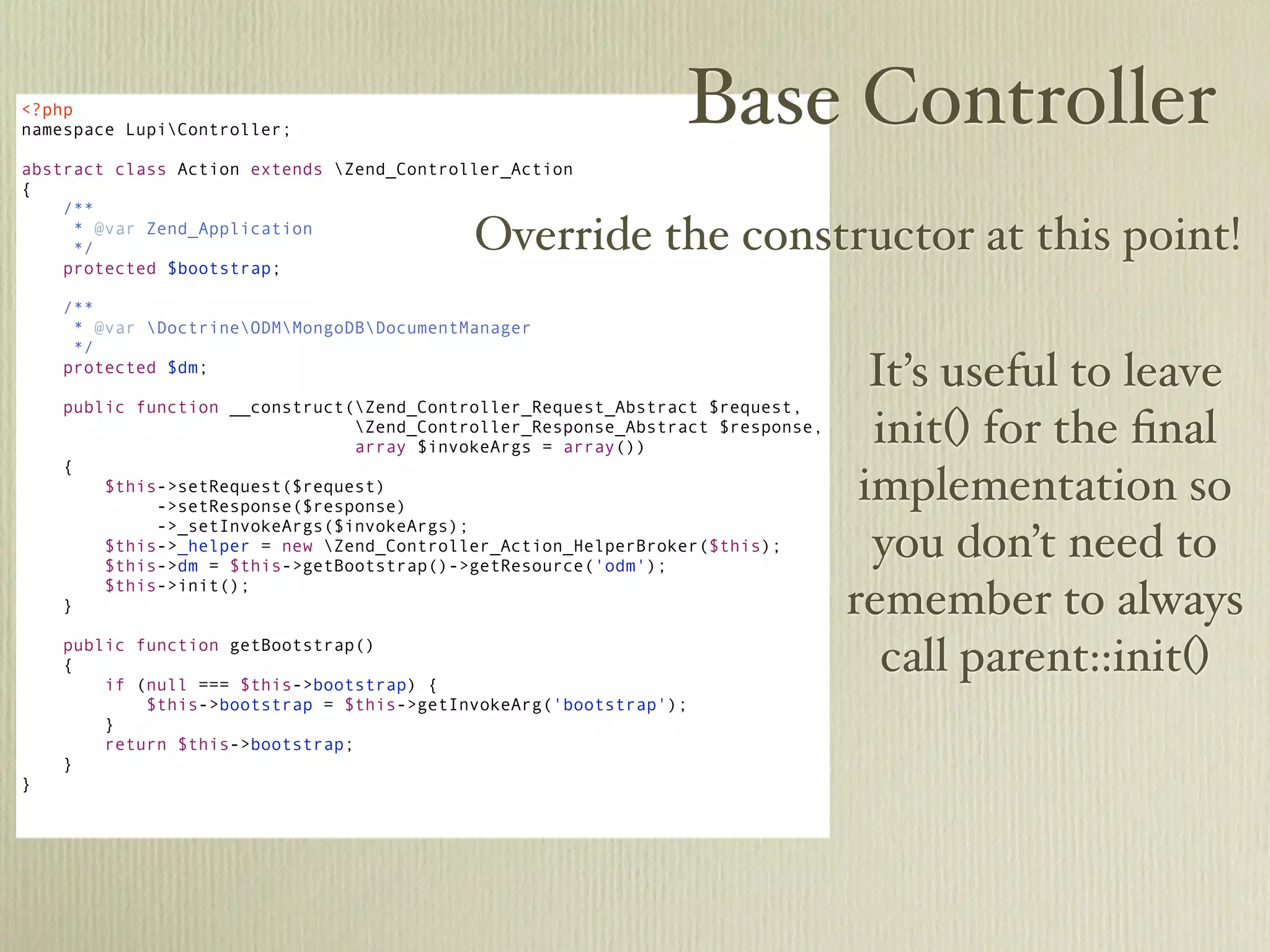
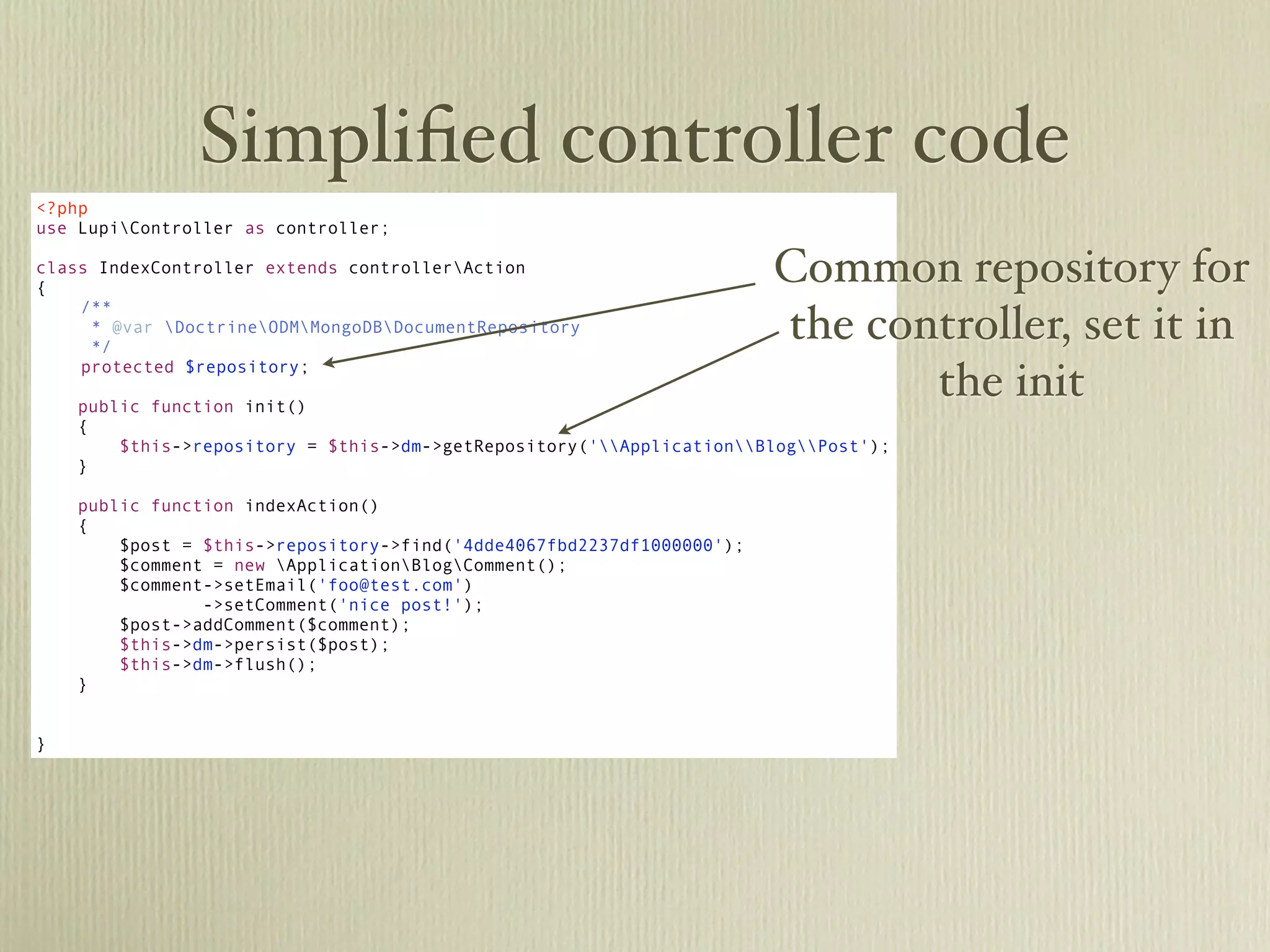
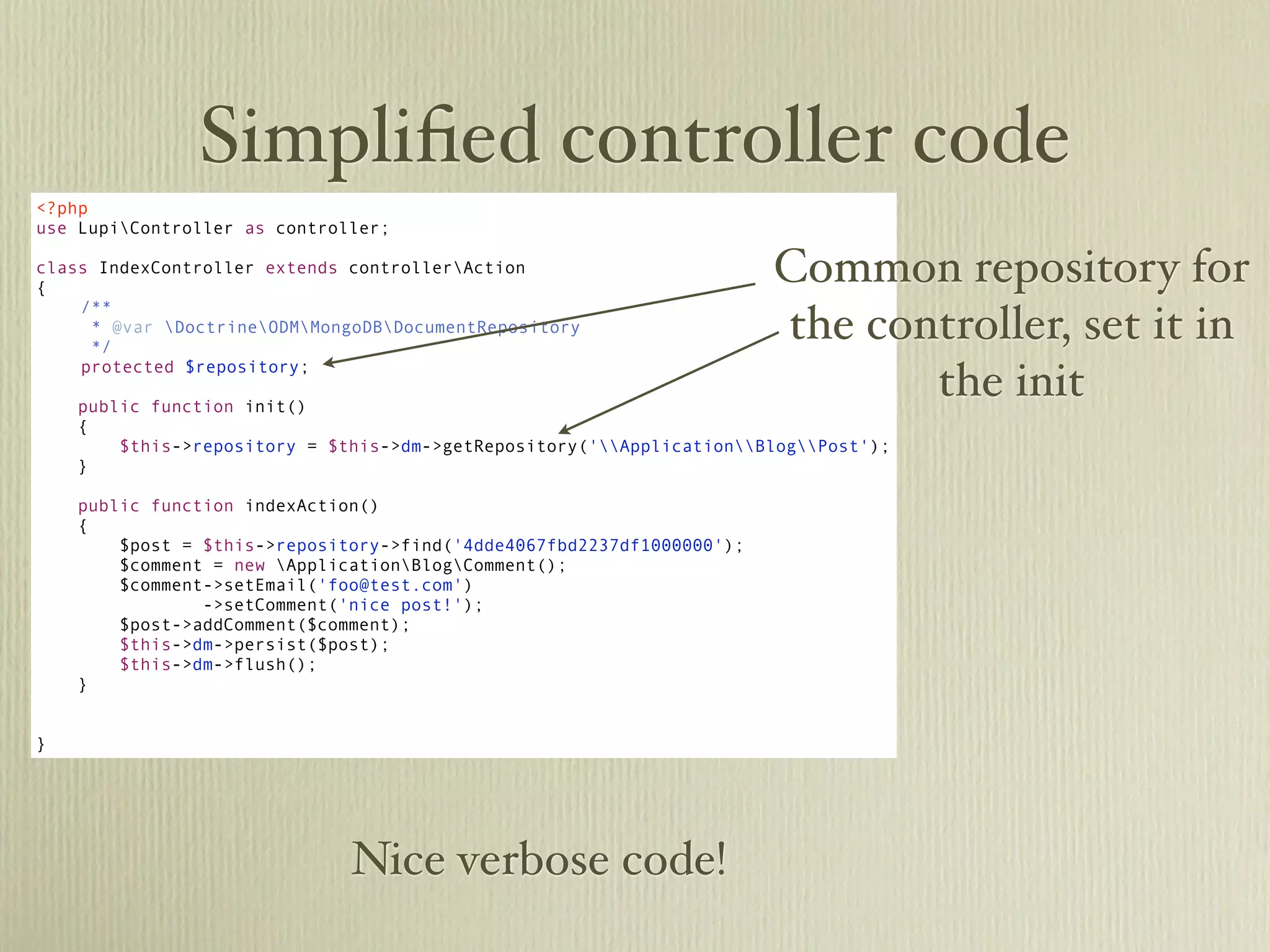

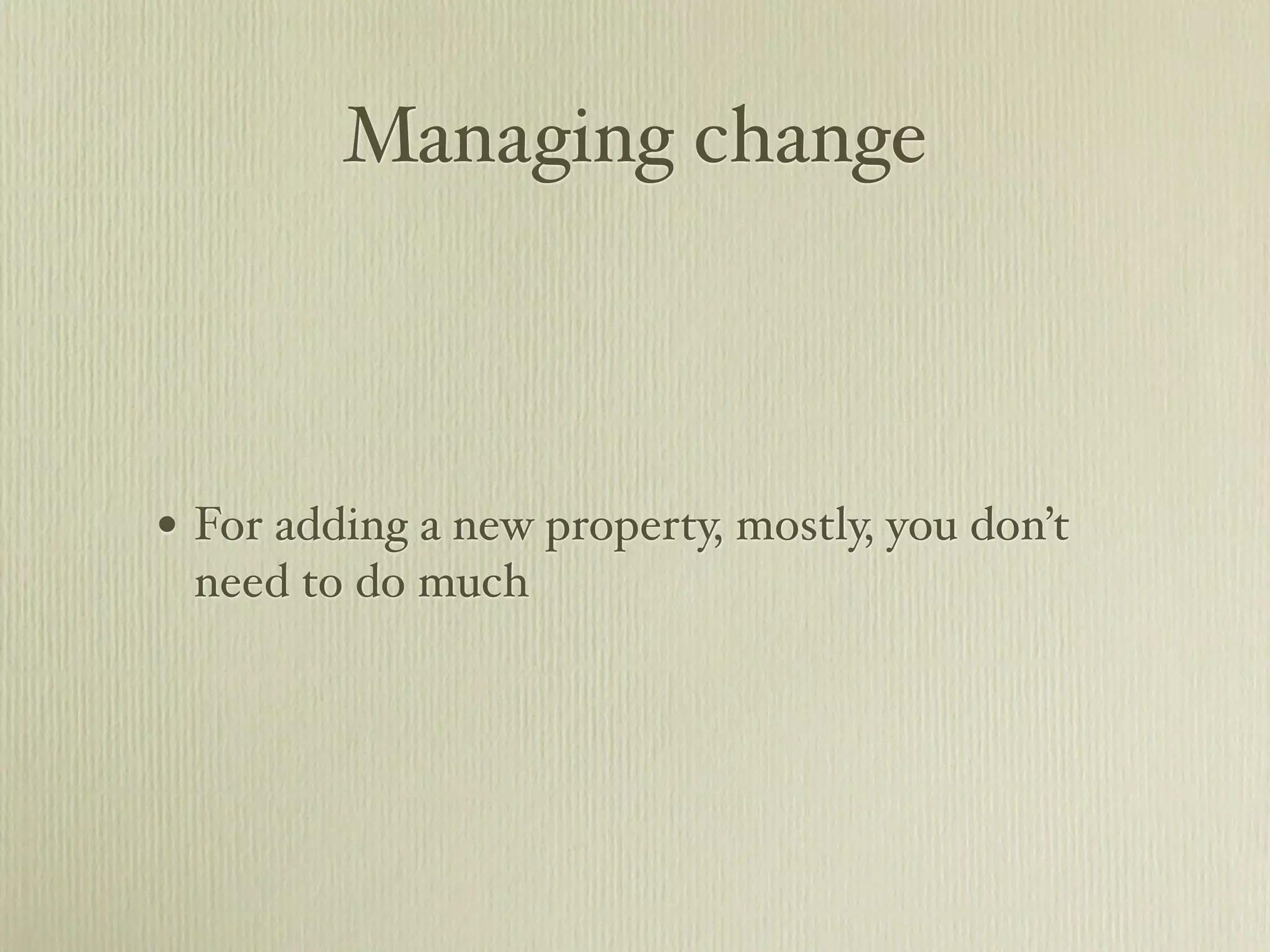
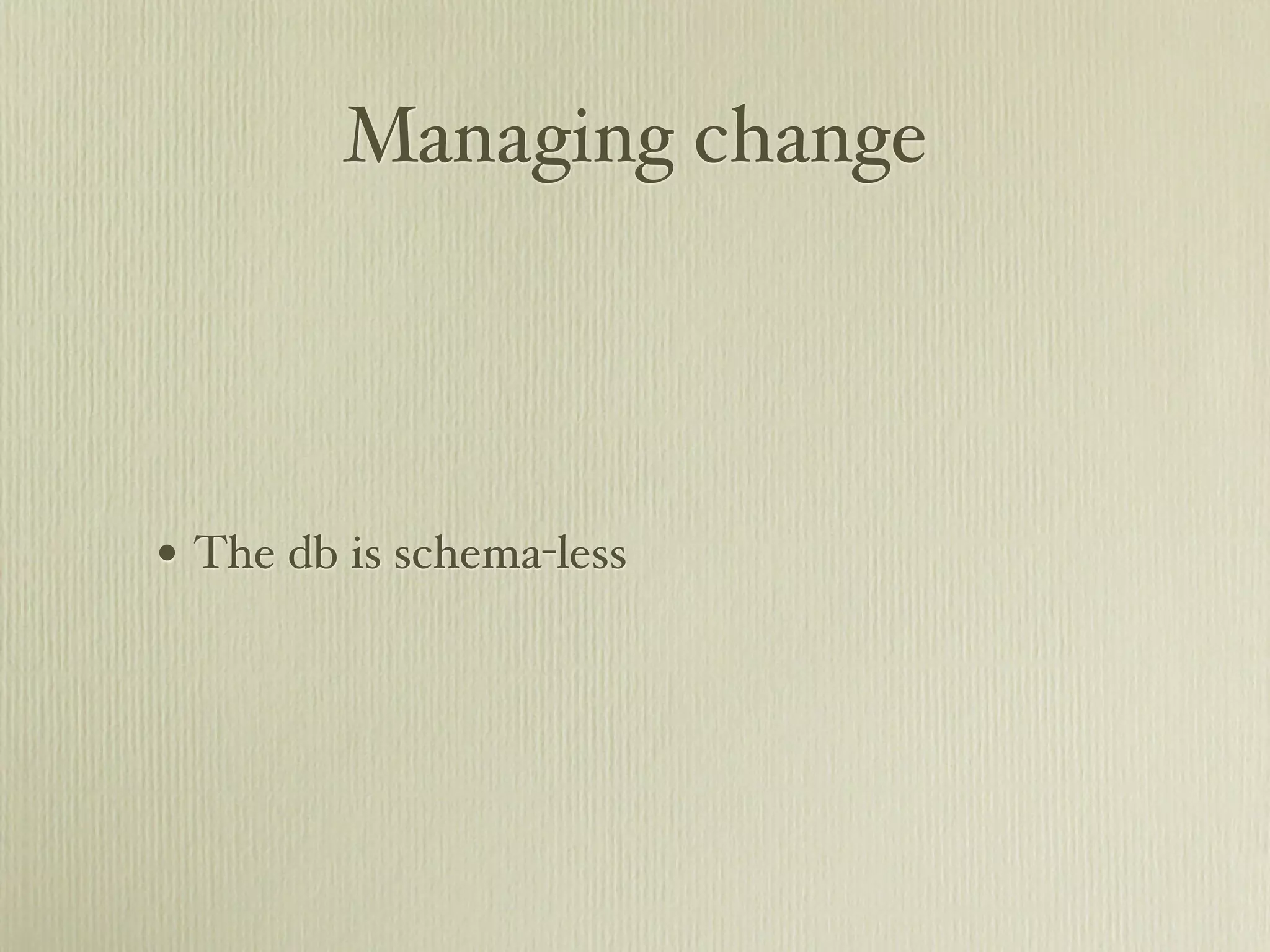
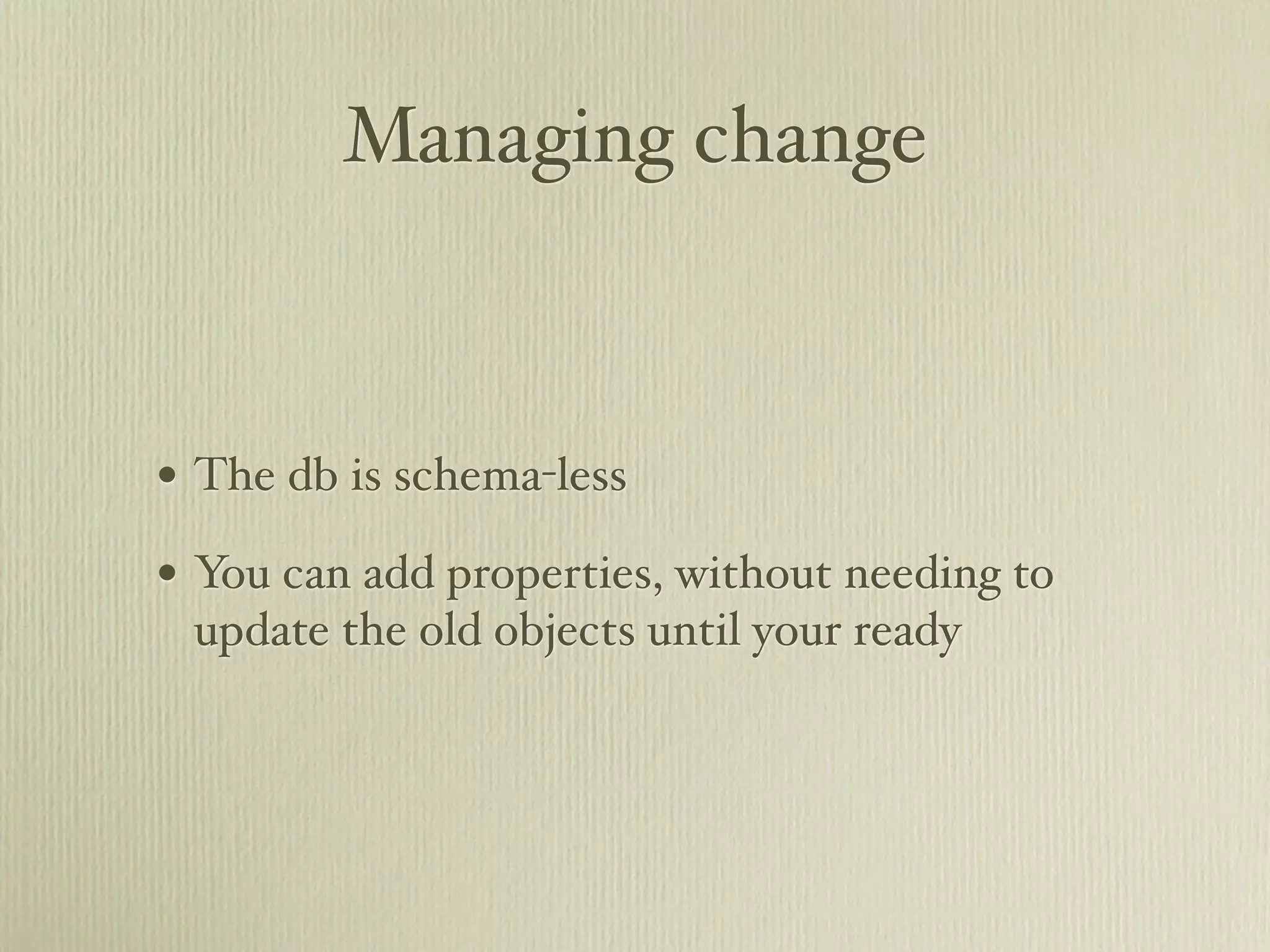
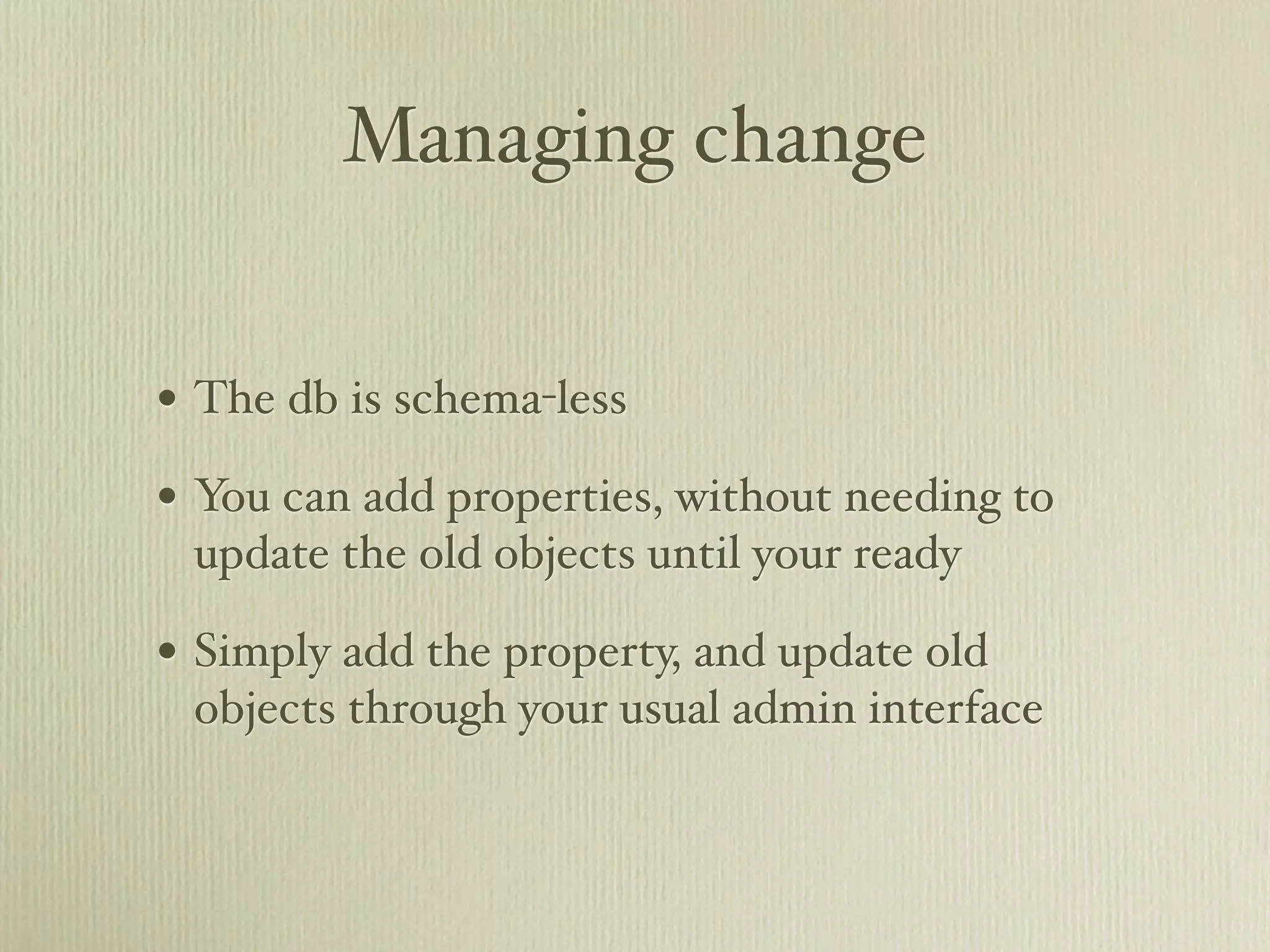
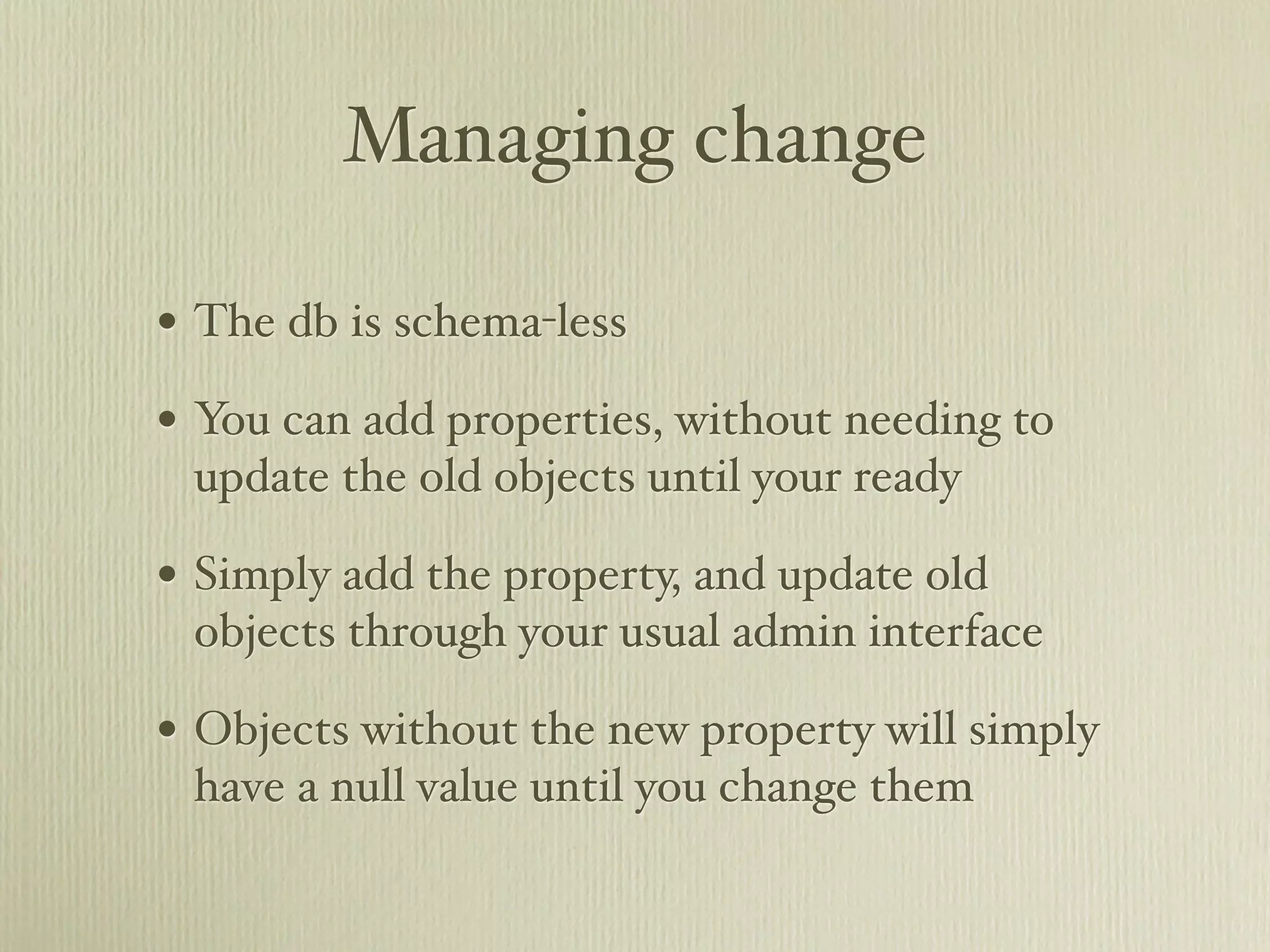
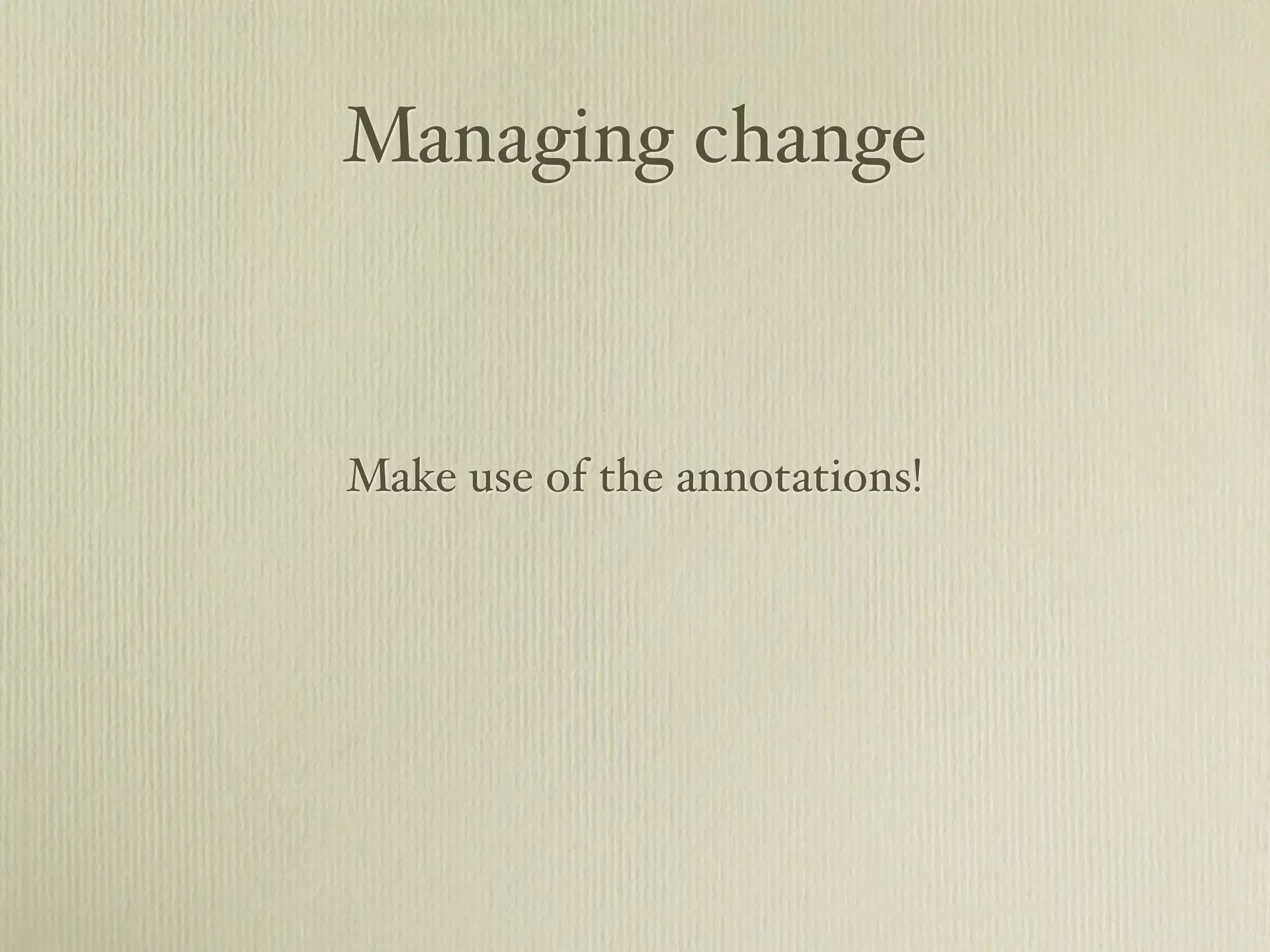
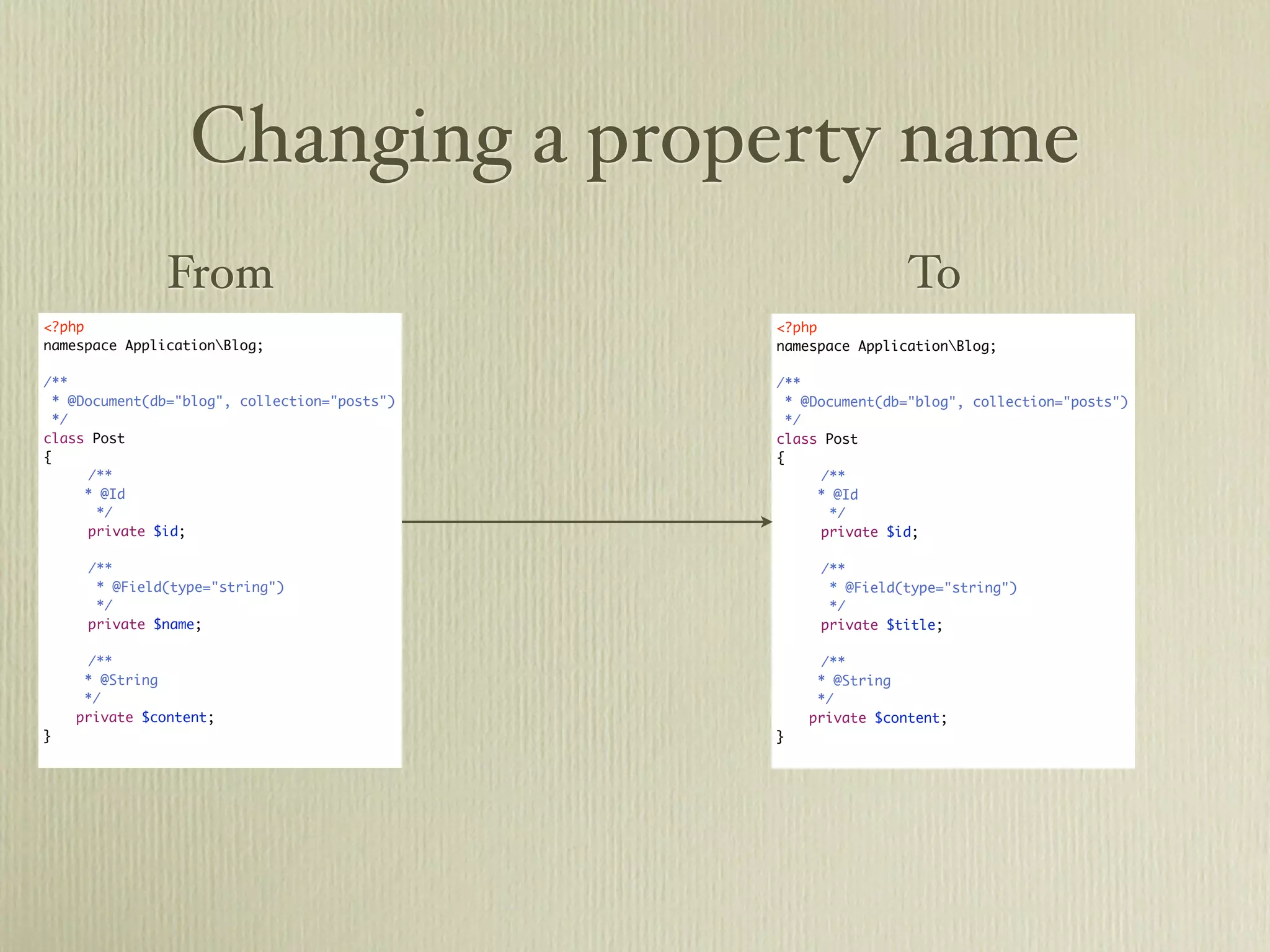
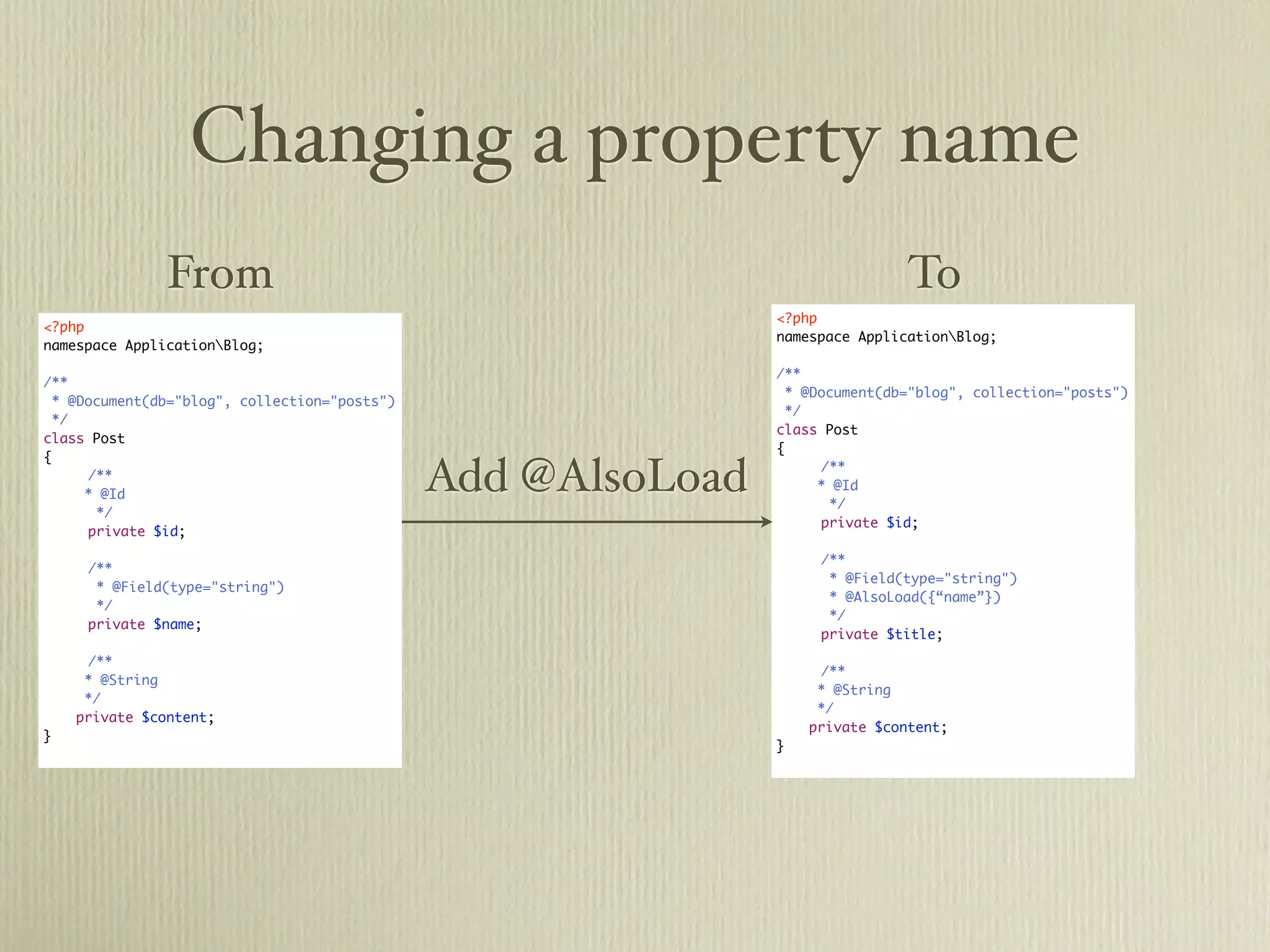
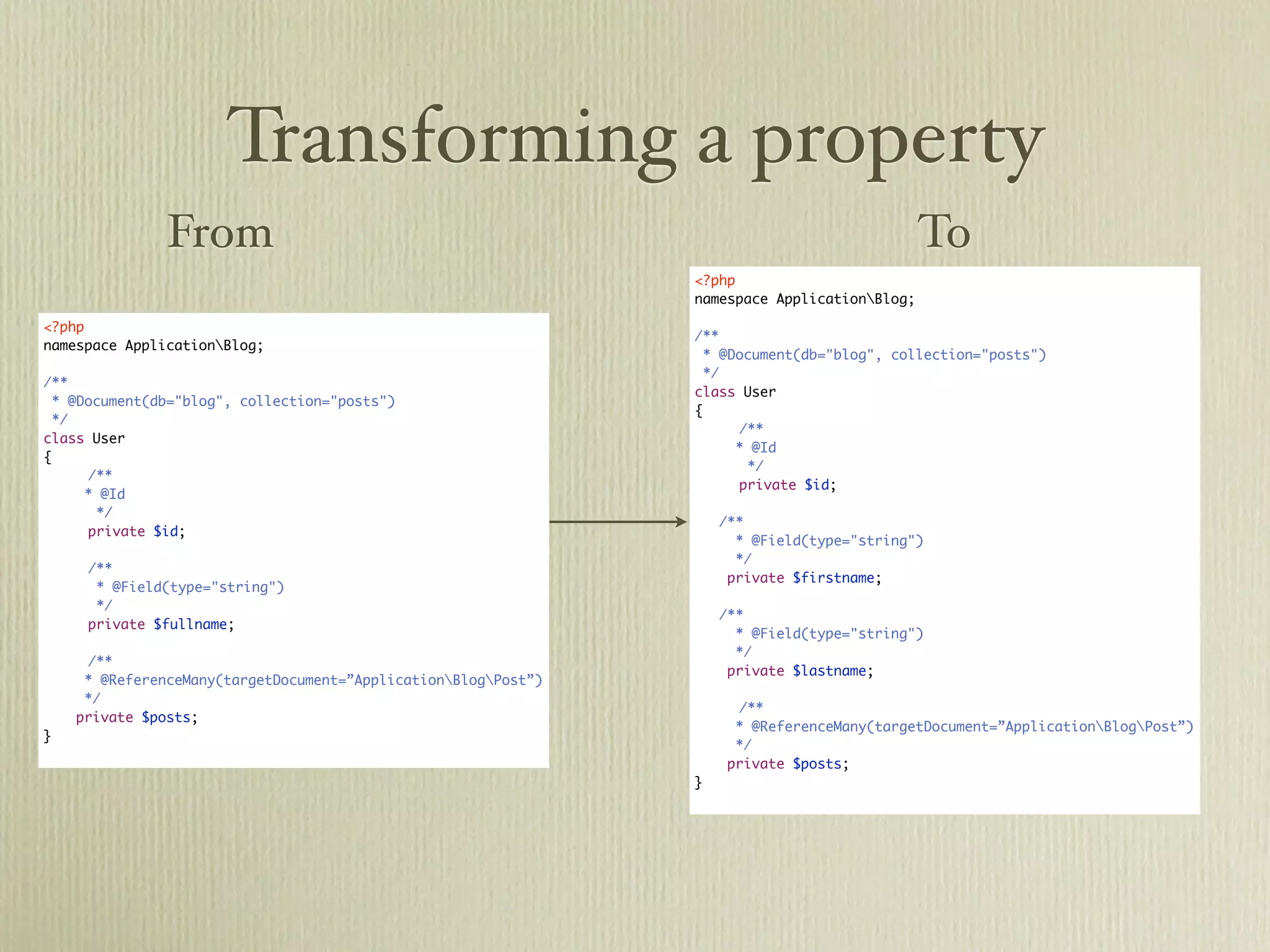
![Transforming a property From <?php To namespace ApplicationBlog; /** * @Document(db="blog", collection="posts") <?php */ namespace ApplicationBlog; class User { /** /** * @Id * @Document(db="blog", collection="posts") */ */ private $id; class User { /** * @Field(type="string") /** */ * @Id private $firstname; */ private $id; /** * @Field(type="string") */ /** private $lastname; * @Field(type="string") */ /** * @ReferenceMany(targetDocument=”ApplicationBlogPost”) private $fulllname; */ private $posts; /** * @ReferenceMany(targetDocument=”ApplicationBlogPost”) /** * @AlsoLoad({“fullname”}) */ */ private $posts; public function populateNameProperties($fullname) } { $name = explode(‘ ‘, $fullname); $this->firstname = $name[0]; $this->lastname = $name[1]; Use a method to migrate using } } @AlsoLoad](https://image.slidesharecdn.com/zf-odm-110527031559-phpapp01/75/Zend-Framework-and-the-Doctrine2-MongoDB-ODM-ZF1-44-2048.jpg)
